| Return home | 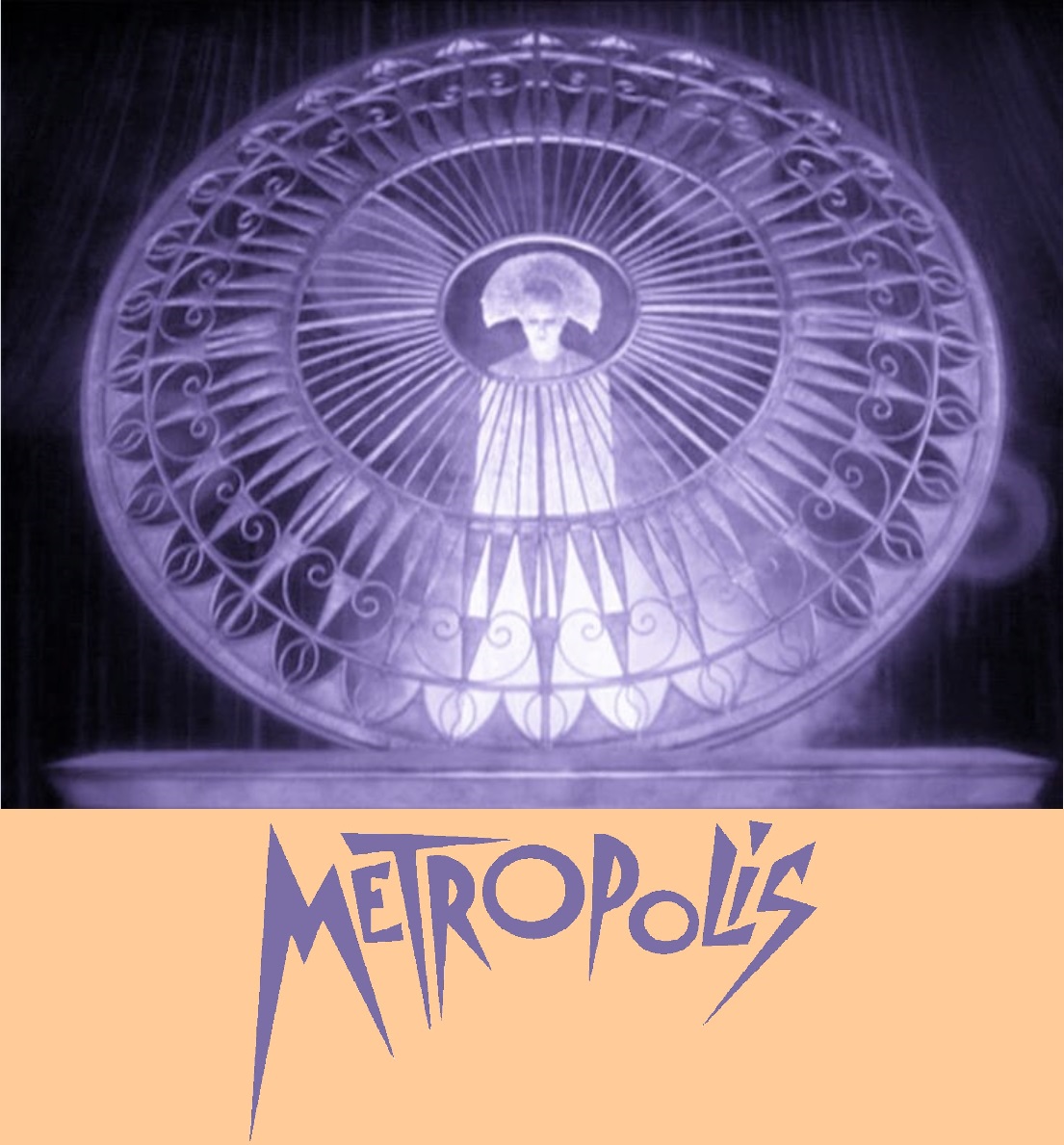 |
Return to previous page |
May 1977: PBS Movie Theater
May 1977: PBS Movie Theater
|

|
|
The above two articles, of course, announced the forthcoming series called
“PBS Movie Theater.”
How much I wish I could find the opening to that “PBS Movie Theater” series.
It was magnificent.
Each episode of “PBS Movie Theater” opened with a title
stating that the following program is made possible in part by a grant from the Exxon Corporation.
That was Arial font, white on black, generated on a Chiron.
Then there was a cue to a different tape, almost certainly a
cart,
which presented us with stunning clips from various Janus films.
I remember that there was the mother carrying her injured child up the steps from Battleship Potemkin,
I remember that there was that glorious shot of the camera dollying in to a traumatized Gelsomina banging on the drum from La strada.
I no longer remember the other clips.
The music accompanying those clips was the opening of Ravel’s orchestration of Mussorgsky’s Pictures at an Exhibition, maybe 40 seconds.
Fade out and fade in to the name of the series, which you can see if you keep scrolling down.
When that was over, the quad was cued back in and the movie started.
I just learned that the series intro was designed by
Philip Gips.
A ha!!!!! I need to find him.
But... he passed away in 2019. Darn!
Fade out image and sound.
Then the movie started.
When the movie ended, that was it; there was no “PBS Movie Theater” closing.
By the way, a preview for an episode of
“PBS Movie Theater”
is available for viewing at the Paley Center Museum of Television and Radio.
In Albuquerque, this series premièred on
Saturday, 3 April 1976, with Lord of the Flies.
It continued through Saturday, 31 December 1977, and then briefly sputtered back to life later on.
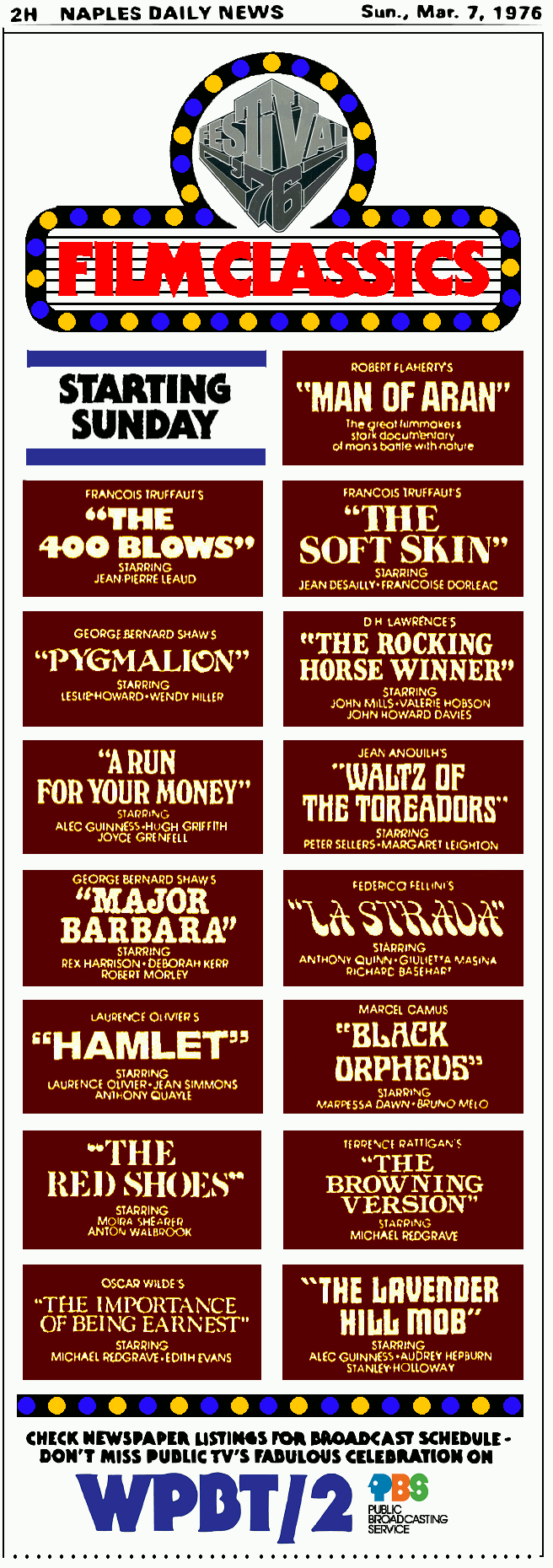 So we can see that 15 of these movies were also licensed for inclusion in “Festival ’76.” I never knew about this, because the UNM Board of Regents banned KNME/5 from participating. |
|
One hundred movies were announced, but the
list was not final.
I don’t think that Annapurna, Aku Aku,
|
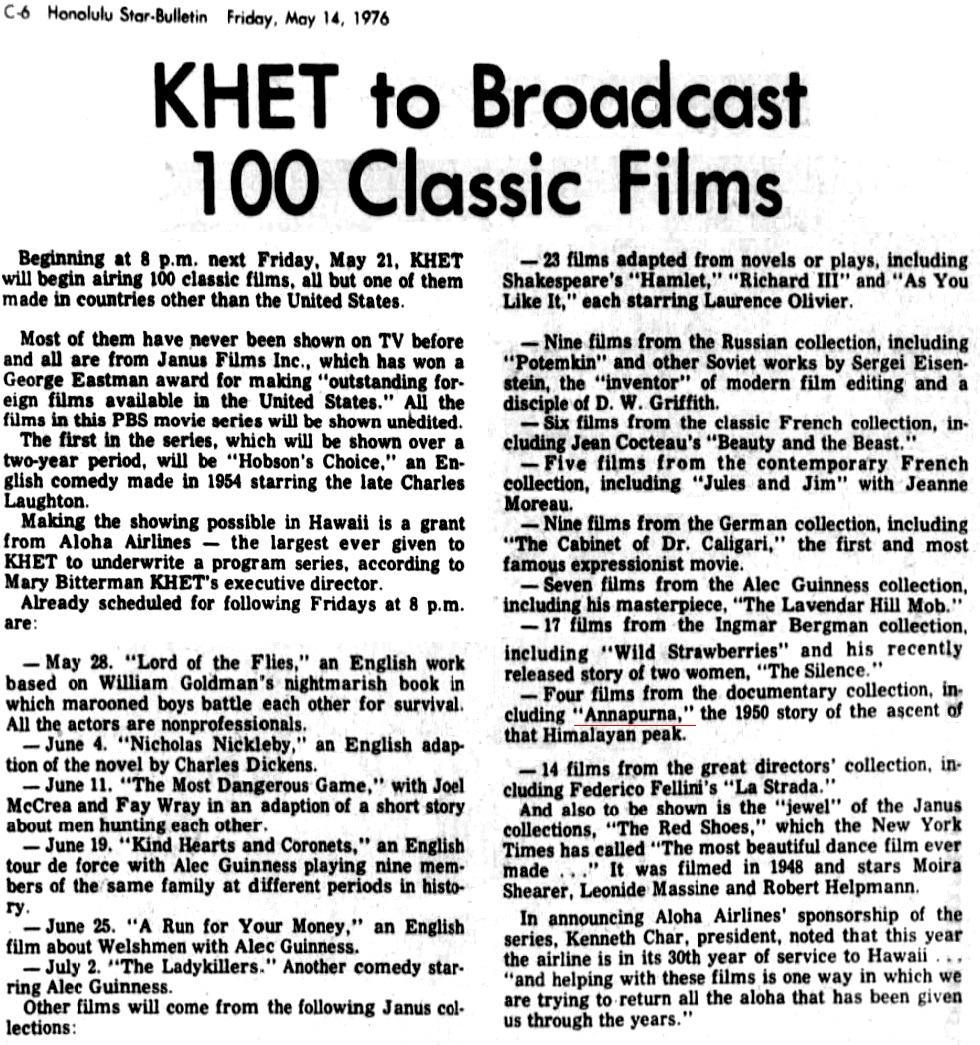 Annapurna? I never knew that was in the Janus catalogue. What were the other three documentaries? Surely Aku Aku, |
 Lord of the Flies Sat, 03 Apr 1976 |
 Nicholas Nickelby Sat, 10 Apr 1976 |
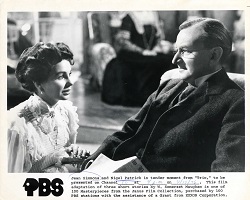 Trio Sat, 17 Apr 1976 |
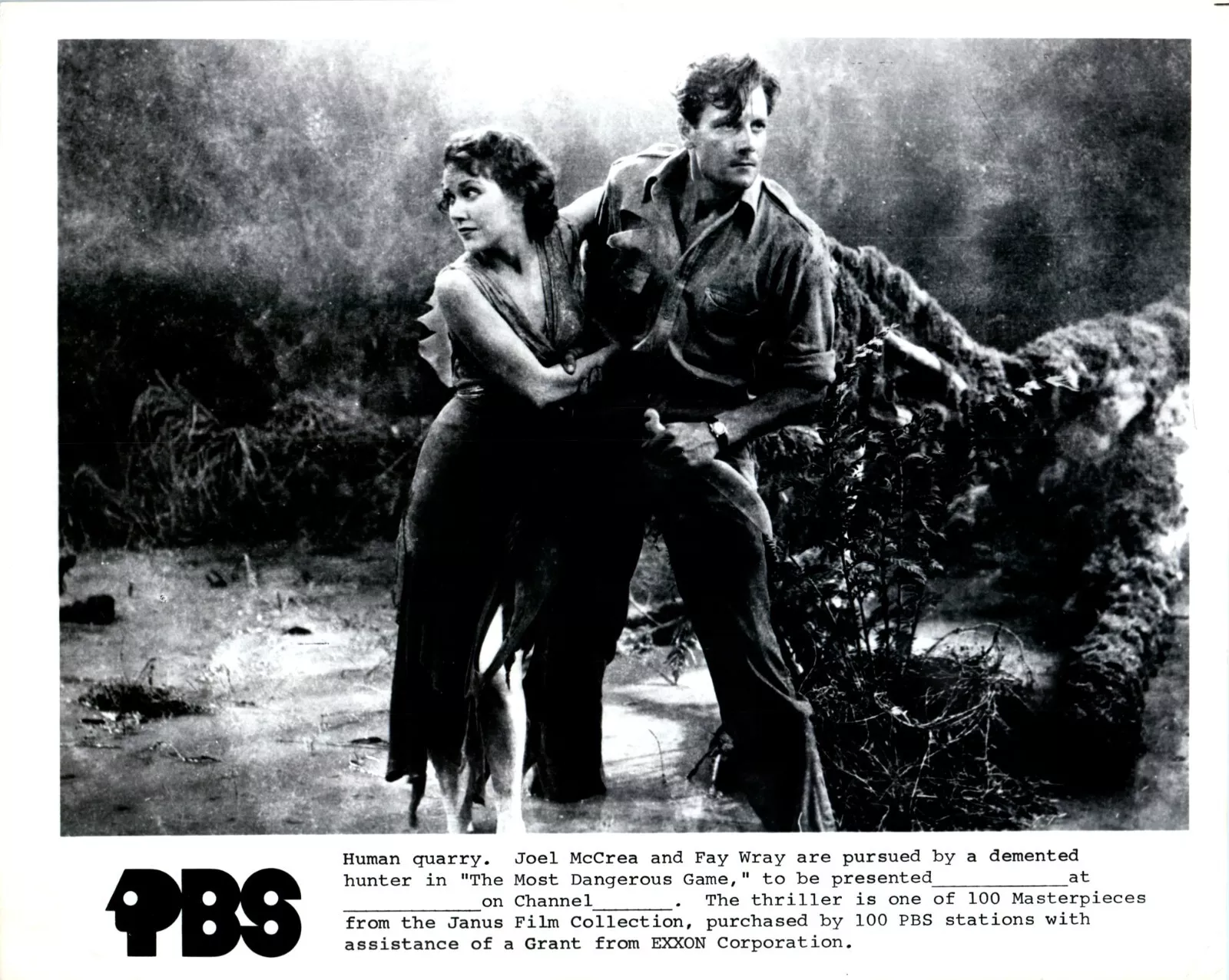 The Most Dangerous Game Sat, 24 Apr 1976 |
|
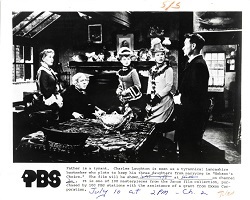 Hobson’s Choice Sat, 01 May 1976 |
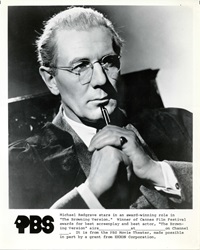 The Browning Version Sat, 15 May 1976 |
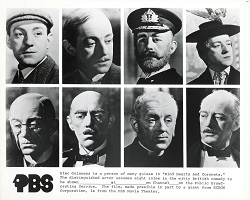 Kind Hearts and Coronets Sat, 05 Jun 1976 |
 A Run for Your Money Sat, 12 Jun 1976 |
|
 The Ladykillers Sat, 19 Jun 1976 |
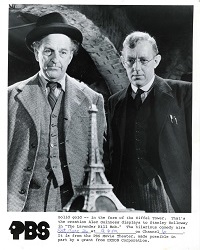 The Lavender Hill Mob Sat, 26 Jun 1976 |
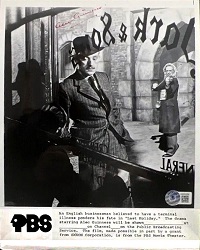 The Last Holiday Sat, 03 Jul 1976 |
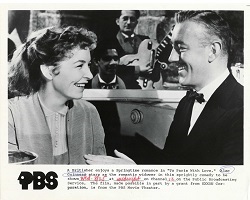 To Paris with Love Sat, 10 Jul 1976 |
|
 The Devil’s Eye Sat, 24 Jul 1976 |
 Dr. Mabuse, the Gambler Sat, 31 Jul 1976 |
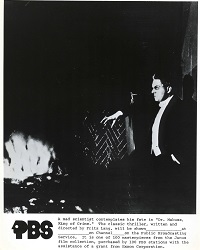 Dr. Mabuse, King of Crime Sat, 07 Aug 1976 |
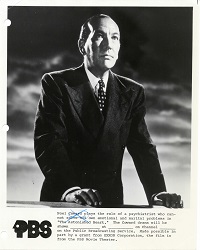 The Astonished Heart Sat, 14 Aug 1976 |
|
 Spies Sat, 21 Aug 1976 |
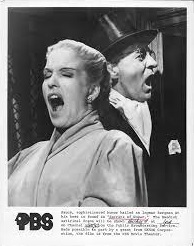 Secrets of Women Sat, 04 Sep 1976 |
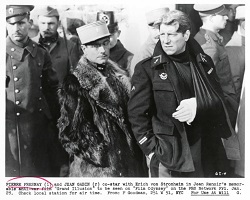 Grand Illusion Sat, 13 Aug 1977 |
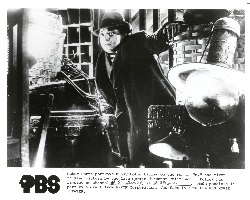 M Sat, 02 Oct 1976 |
|
 The Blue Angel Sat, 09 Oct 1976 |
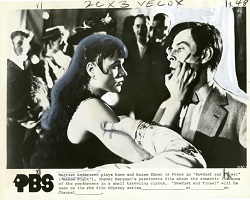 Sawdust and Tinsel Tue, 26 oct 1976 |
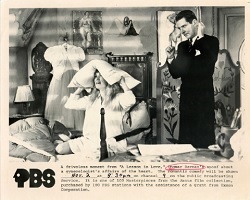 A Lesson in Love Tue, 02 Nov 1976 |
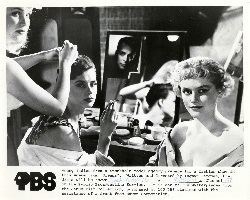 Dreams Tue, 09 Nov 1976 |
|
 Smiles of a Summer Night Tue, 16 Nov 1976 |
 The Importance of Being Earnest Tue, 30 Nov 1976 |
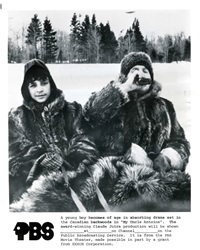 My Uncle Antoine (not shown in Albuquerque) |
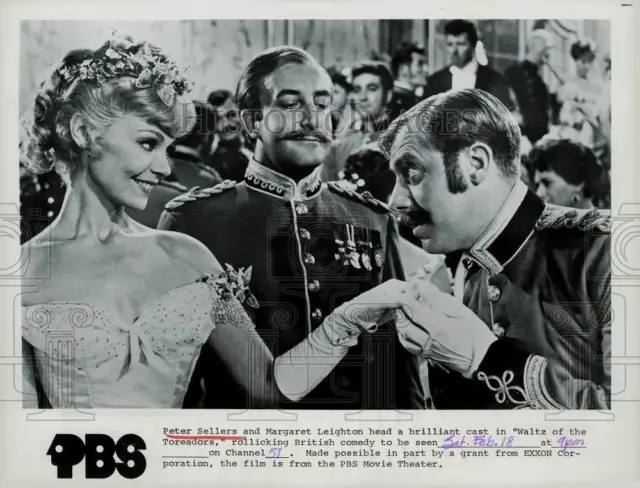 Waltz of the Toreadors Tue, 14 Dec 1976 |
|
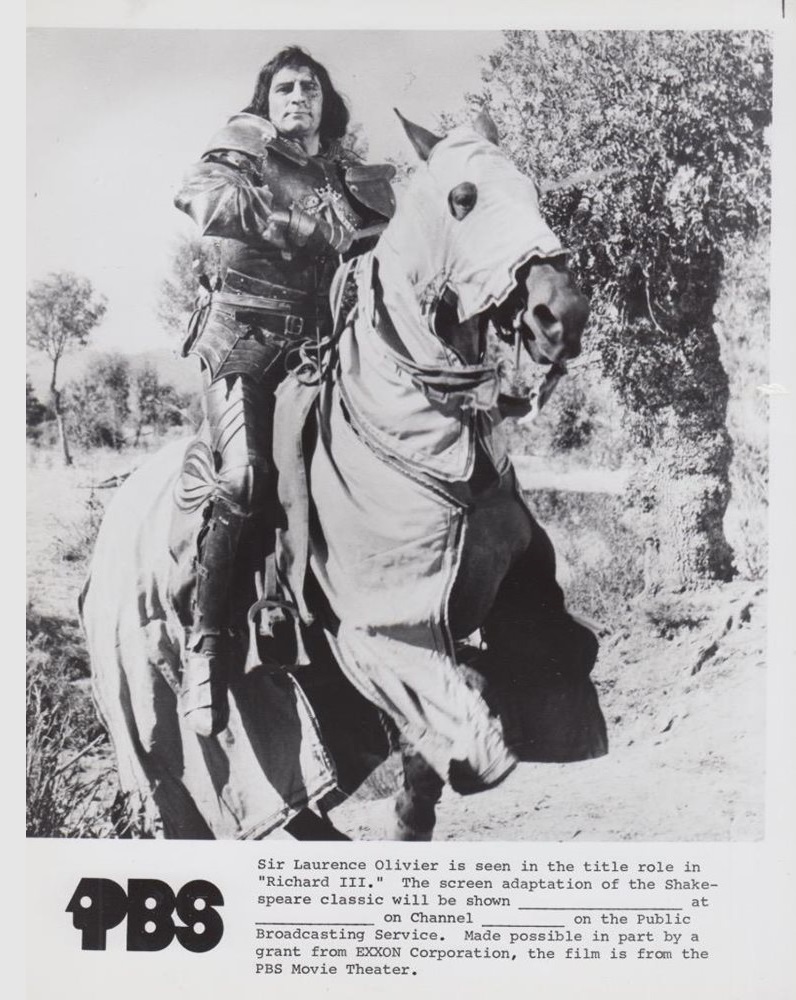 Richard III Tue, 28 Dec 1976 |
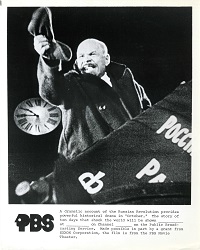 October (Ten Days That Shook the World) Tue, 11 Jan 1977 (not shown in Albuquerque) |
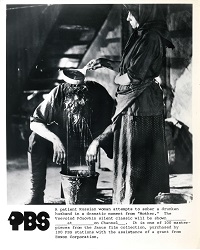 Mother Tue, 18 Jan 1977 (not shown in Albuquerque) |
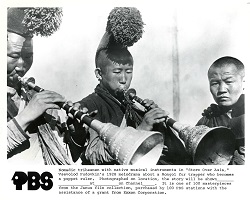 Storm over Asia Sat, 29 Jan 1977 |
|
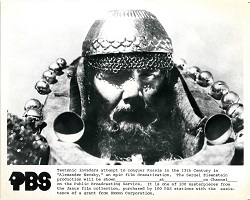 Alexander Nevsky Sat, 12 Feb 1977 |
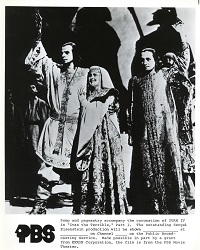 Ivan the Terrible, Part I Sat, 19 Feb 1977 (not shown in Albuquerque) |
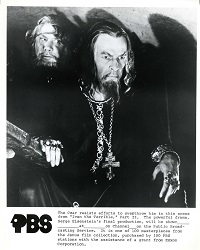 Ivan the Terrible, Part II Sat, 26 Feb 1977 (not shown in Albuquerque) |
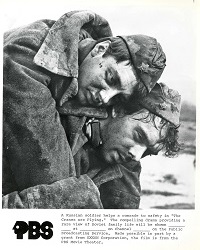 The Cranes Are Flying (not shown in Albuquerque) |
|
 Ballad of a Soldier (not shown in Albuquerque) |
 Pygmalion Sat, 12 Mar 1977 |
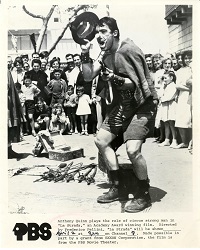 La strada Sat, 02 Apr 1977 |
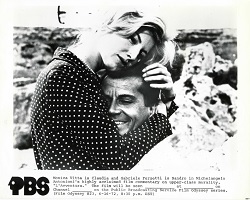 L’avventura Sat, 16 Apr 1977 |
|
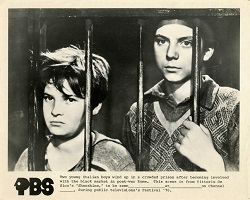 Shoeshine Sat, 23 Apr 1977 |
 The Cabinet of Dr. Caligari Sat, 14 May 1977 |
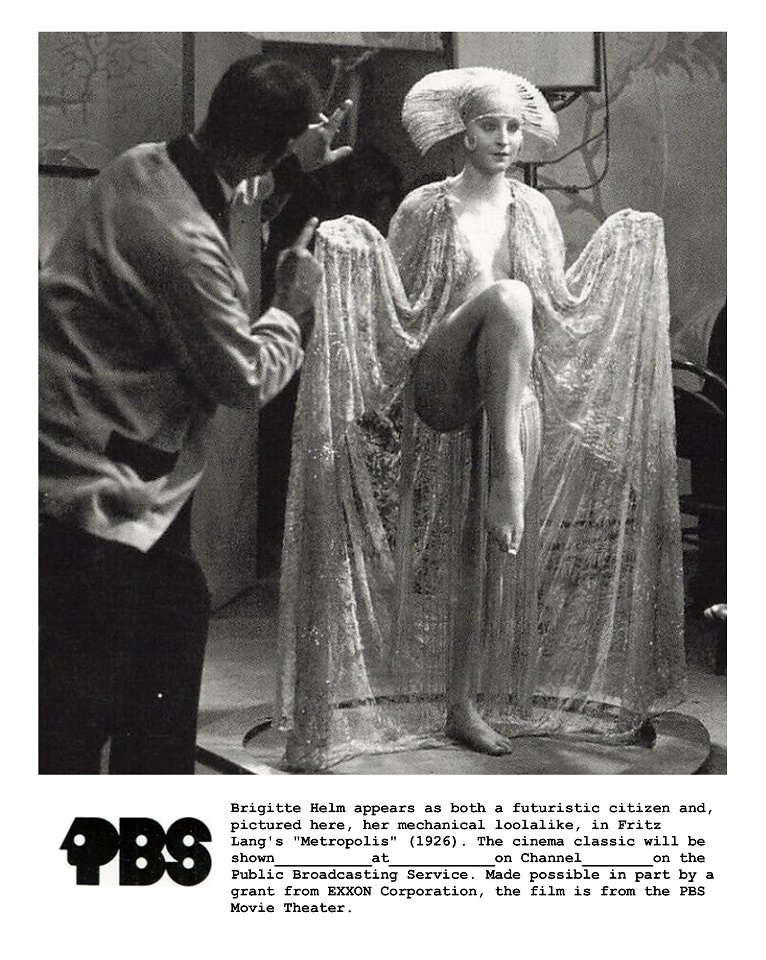 Metropolis Sat, 21 May 1977 |
 Queen of Spades Sat, 04 Jun 1977 |
|
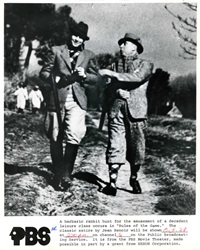 The Rules of the Game Sat, 02 Jul 1977 |
 The Soft Skin Sat, 09 Jul 1977 |
 Beauty and the Beast Sat, 23 Jul 1977 |
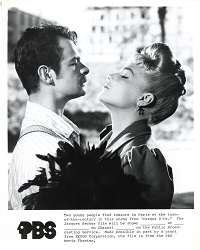 Casque d’ or Sat, 06 Aug 1977 |
|
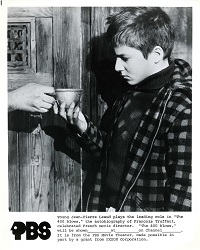 The 400 Blows Sat, 20 Aug 1977 |
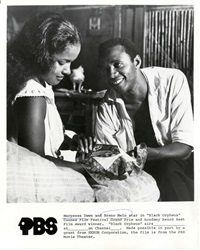 Black Orpheus (not shown in Albuquerque) |
 Fame Is the Spur Sat, 01 Oct 1977 |
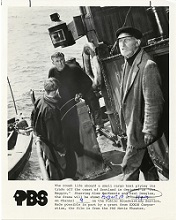 The Maggie Sat, 15 Oct 1977 |
|
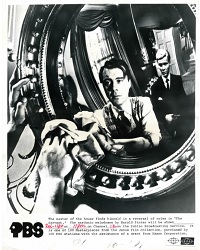 The Servant Sat, 22 Oct 1977 |
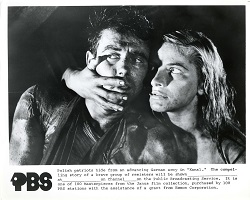 Kanal Sat, 29 Oct 1977 |
 Knife in the Water Sat, 05 Nov 1977 |
 Forbidden Games Sat, 10 Dec 1977 |
|
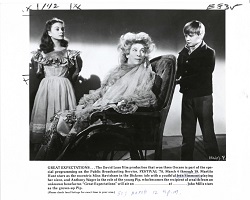 Great Expectations (not shown in Albuquerque) |
 Pandora’s Box Sat, 24 Dec 1977 |
 The Last Laugh Sat, 31 Dec 1977 |
 As You Like It Sat, 29 Jul 1978 |
|
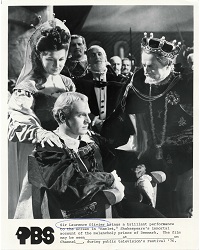 Hamlet Sat, 05 Aug 1978 |
 Torment Sat, 23 Sep 1978 |
--> |
| “PBS MOVIE THEATER” IN ALBUQUERQUE | ||
|
Pre-emptions and gaps in the record can be filled in with Atlanta, Georgia, WGTV listings,
which almost exactly paralleled KNME’s schedule,
as well as by listings in Santa Fé and Carlsbad, which received KNME’s signal.
The majority of stations that licensed this series presented the movies in the same order as appears in the chart below.
Very few stations broadcast:
• My Uncle Antoine
• The Cranes Are Flying • Ballad of a Soldier • Black Orpheus • The Silence • Through a Glass Darkly • The Passion of Joan of Arc • The • Great Expectations
and so my best guess is that those were premium episodes available only at a premium cost.
That’s 9 premium episodes, and, interestingly, 9 episodes were repeated almost everywhere:
• The Ladykillers (19 Jun 1976 repeated 07 Dec 1976)
• The Man in the White Suit (17 Jul 1976 repeated 18 Jun 1977) • Grand Illusion (11 Sep 1976 repeated 13 Aug 1977) • Kind Hearts and Coronets (05 Jun 1976 repeated 27 Aug 1977) • Last Holiday (03 Jul 1976 repeated 03 Sep 1977) • Hobson’s Choice (01 May 1976 repeated 17 Sep 1977) • The Browning Version (15 May 1976 repeated 24 Sep 1977) • The Blue Angel (09 Oct 1976 repeated 03 Dec 1977) • M (02 Oct 1976 repeated 17 Dec 1977)
So, quite obviously, the repeated episodes filled in the gaps left by the exclusion of the 9 premium episodes.
It was not a one-to-one substitution, since episodes were gleefully scrambled and shunted around.
What I suppose happened was that for the stations that opted not to broadcast the premium episodes,
PBS supplied a list of suggested repeats to fill out the schedule.
Chronologically, there is no match whatsoever.
This list of repeats does not take into account other repeats that KNME Channel 5 employed to fill in empty time slots,
nor does it take into account repeats in the 1978 supplementary seasons.
Also, it appears to me that the extra 9 episodes were not offered as a package, but individually,
since different educational stations licensed different episodes.
Stations licensed the basic package of 93 episodes, and a few stations licensed maybe one or two more on top of that.
I do not know of any station that licensed all 102 episodes.
|
||
| 01. |
Sat 03 Apr 1976 9:00pm |
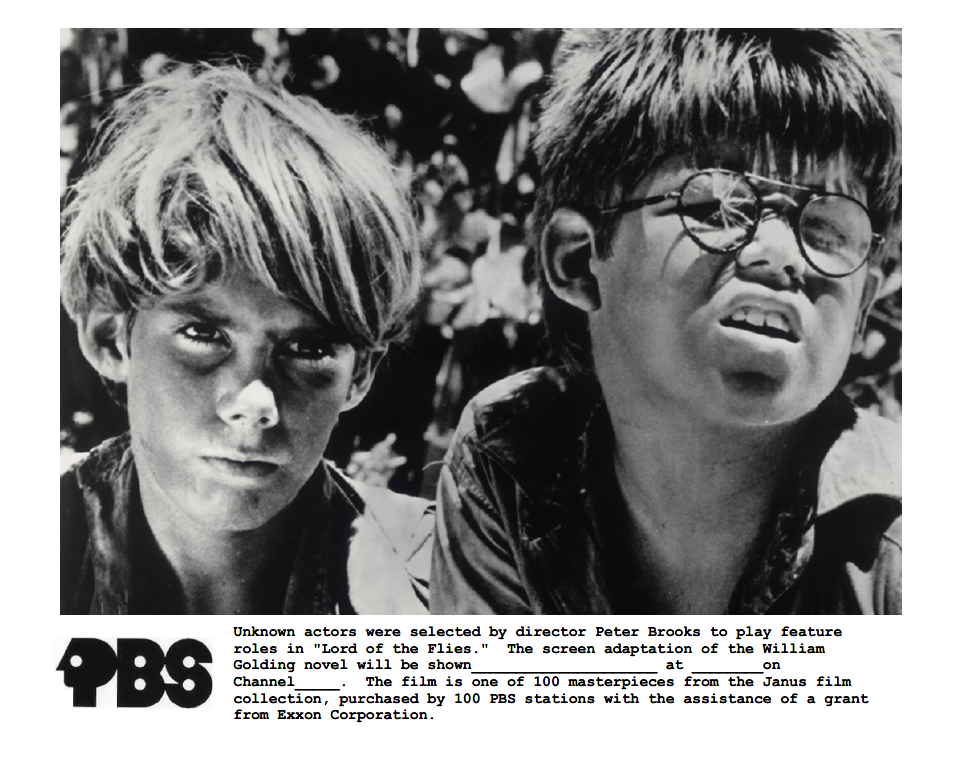 Lord of the Flies (The illustration is my forgery, based upon display ads in newspapers.) |
| 02. |
Sat 10 Apr 1976 9:00pm |
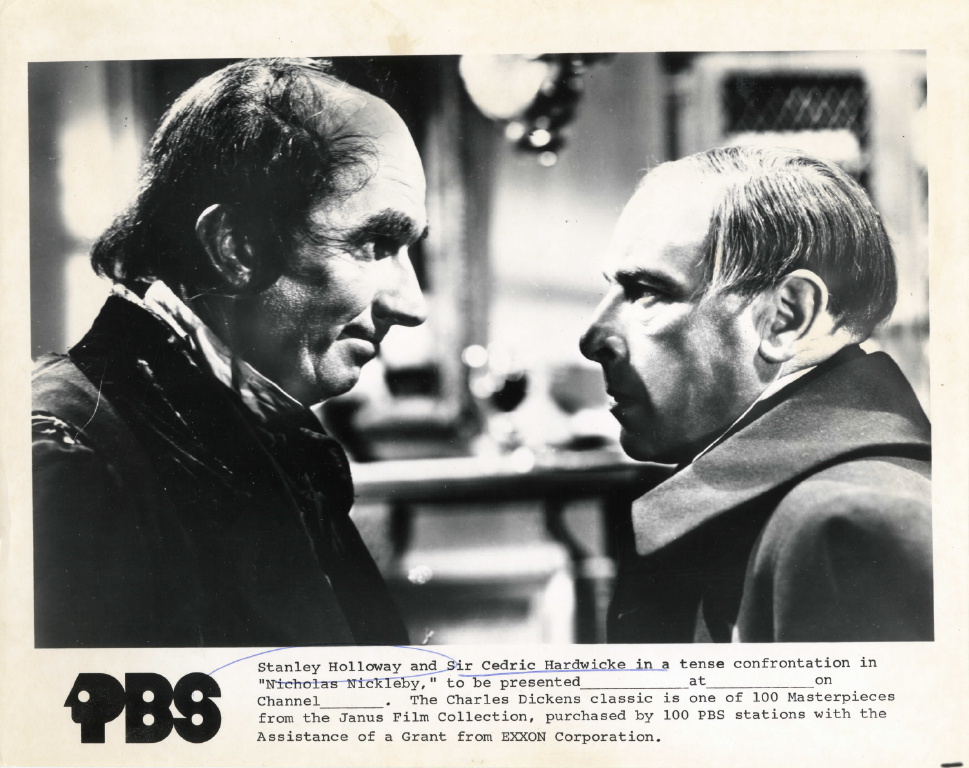 Nicholas Nickleby (1976-04-17-Sat-2200-WNED17. 1977-02-01-Tue-2130-WNED17.) |
| 03. |
Sat 17 Apr 1976 9:00pm |
 Trio (1976-04-24-Sat-2200-WNED17. 1977-04-12-Tue-2130-WNED17.) |
| 04. |
Sat 24 Apr 1976 9:00pm |
 The Most Dangerous Game |
| 05. |
Sat 01 May 1976 9:00pm |
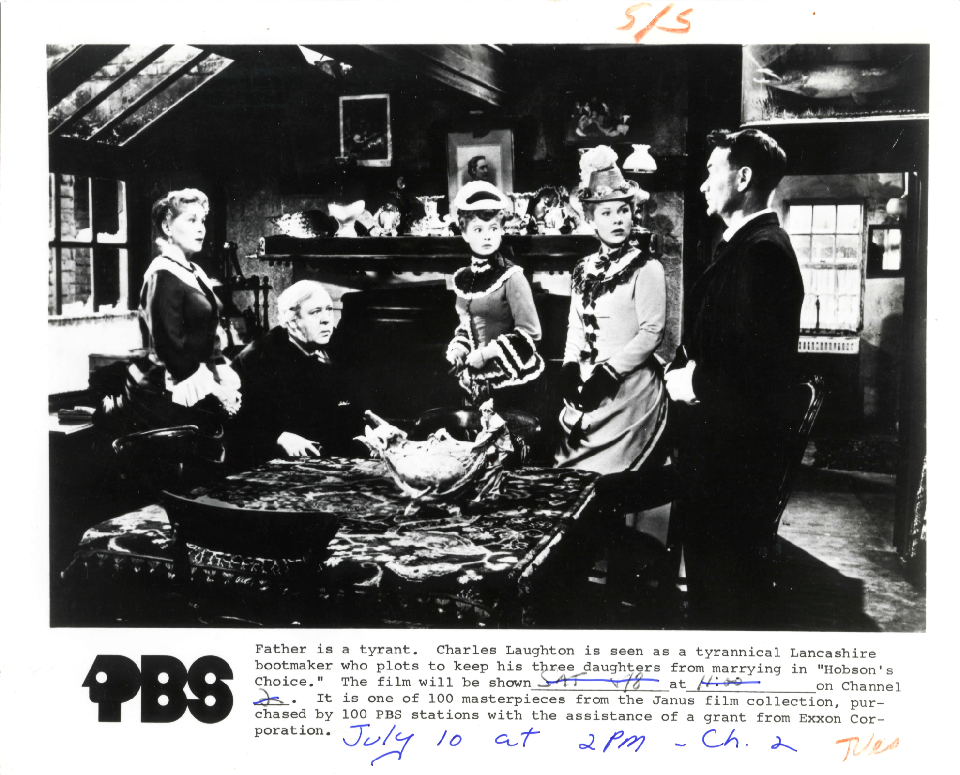 Hobson’s Choice |
| 06. |
Sat 08 May 1976 9:00pm |
Encore (1977-07-26-Tue-2100-WNED17. 1979-07-30-Mon-1300-WNED17) |
| 07. |
Sat 15 May 1976 9:00pm |
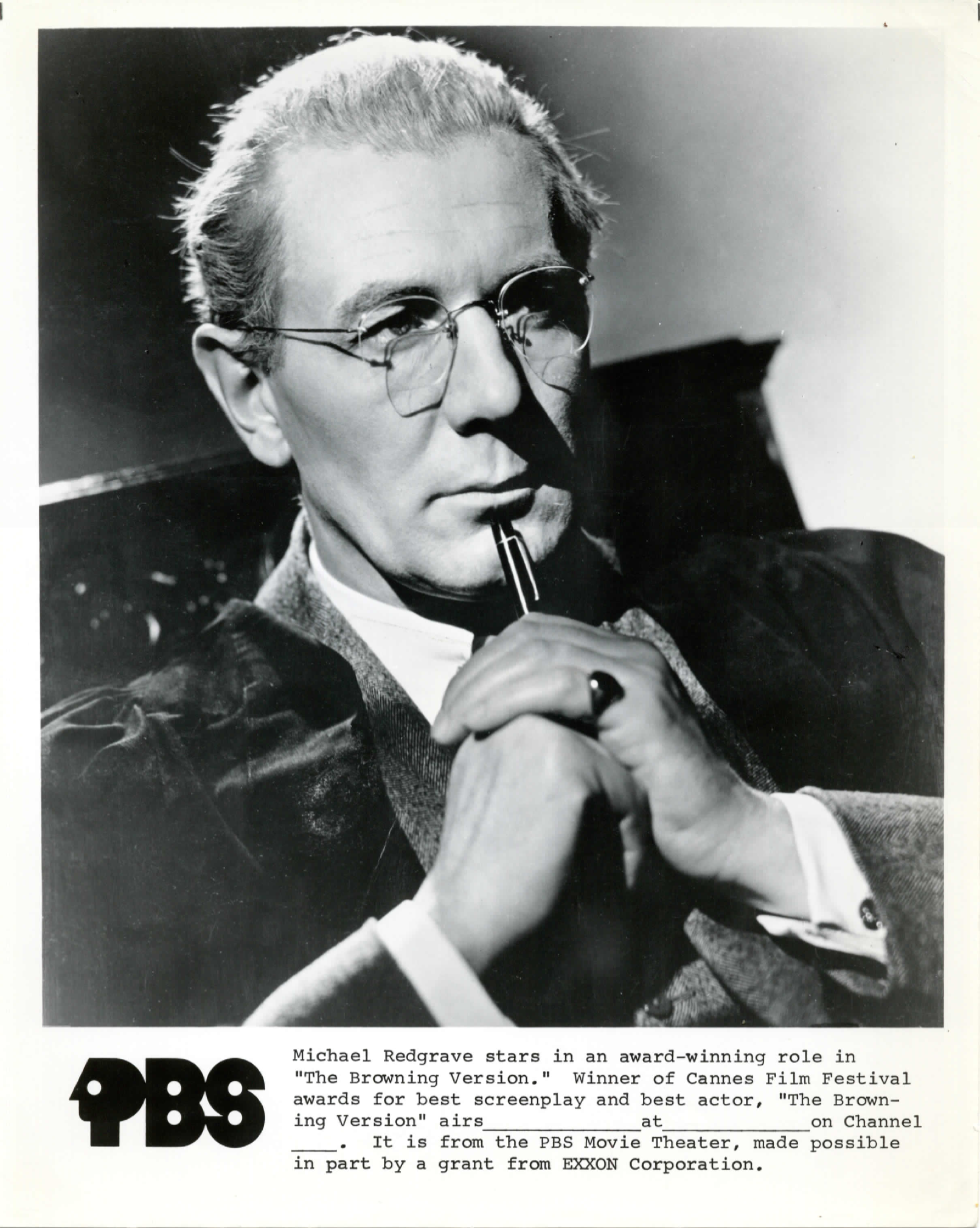 The Browning Version |
| 08. |
Sat 22 May 1976 9:00pm |
Quartet (1976-05-22-Sat-2100-WNED17.) |
| 09. |
Sat 29 May 1976 9:00pm |
Man of Aran |
| 10. |
Sat 05 Jun 1976 9:00pm |
 Kind Hearts and Coronets |
| 11. |
Sat 12 Jun 1976 9:00pm |
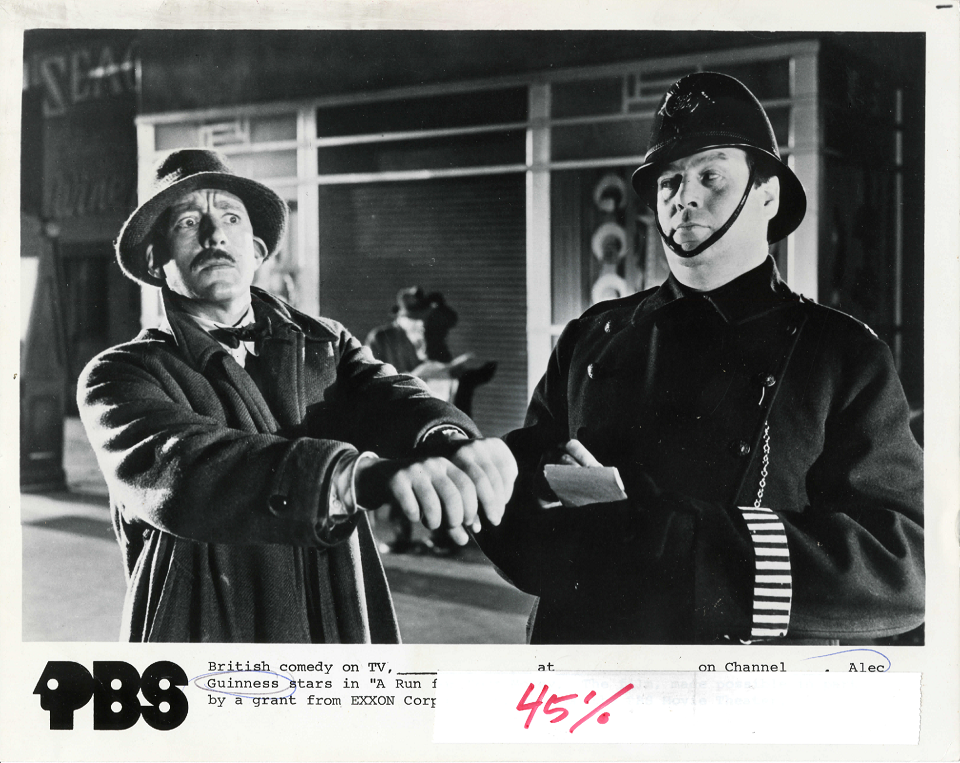 A Run for Your Money |
| 12. |
Sat 19 Jun 1976 9:00pm |
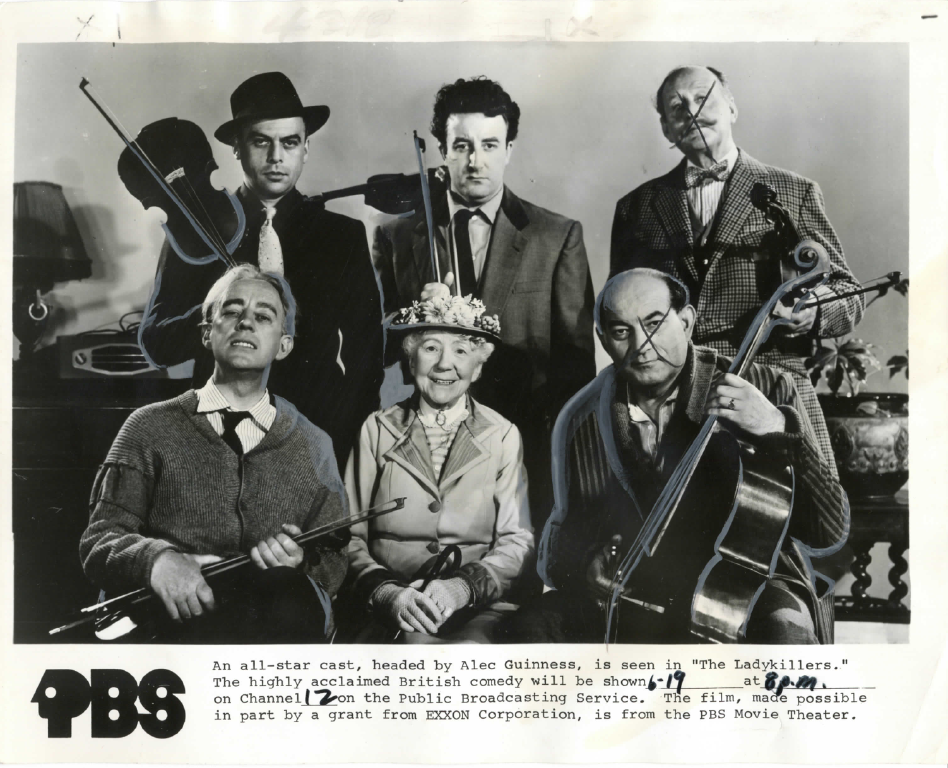 The Ladykillers ✓ |
| 13. |
Sat 26 Jun 1976 9:00pm |
 The Lavender Hill Mob |
| 14. |
Sat 03 Jul 1976 9:00pm |
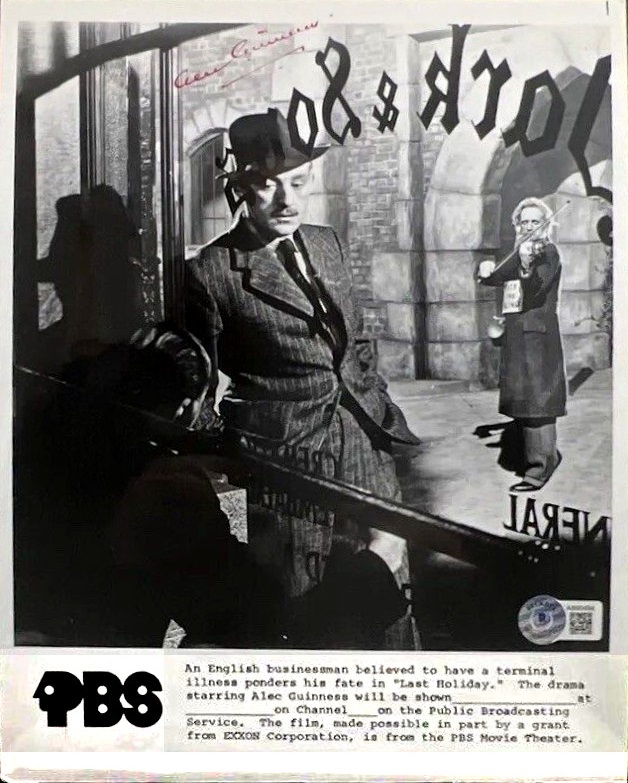 The Last Holiday |
| 15. |
Sat 10 Jul 1976 9:00pm |
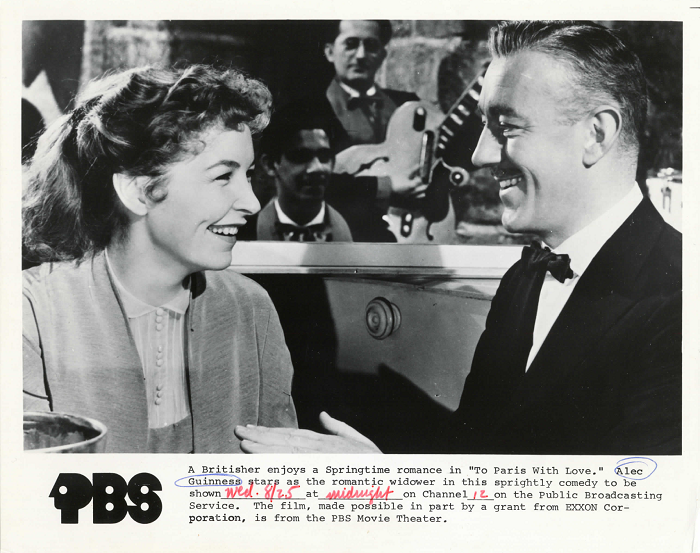 To Paris with Love |
| 16. |
Sat 17 Jul 1976 9:00pm |
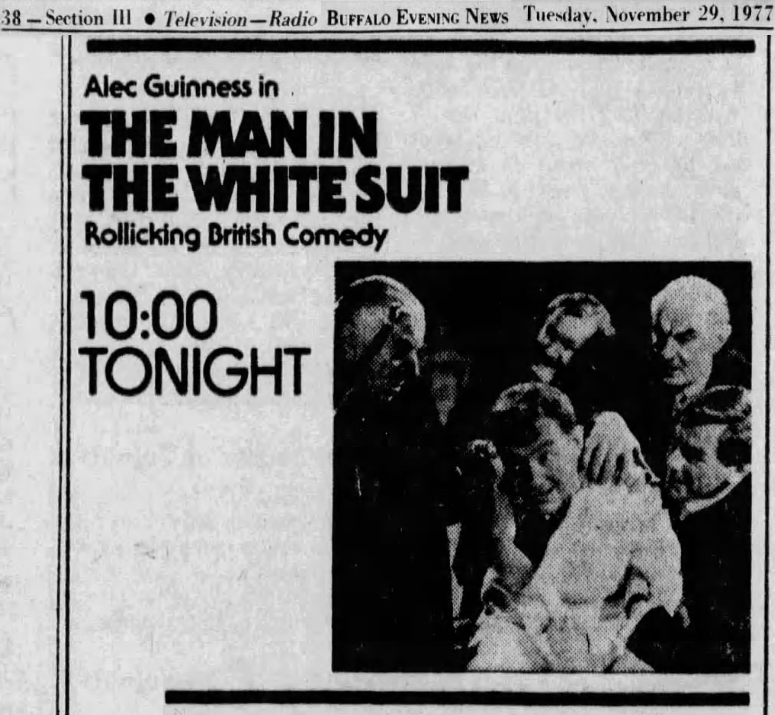 The Man in the White Suit |
| 17. |
Sat 24 Jul 1976 9:00pm |
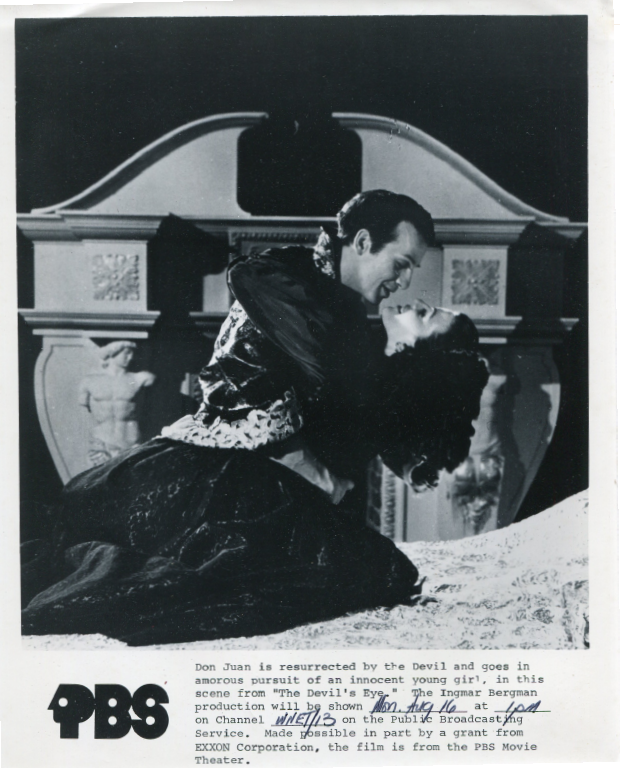 The Devil’s Eye |
| 18. |
Sat 31 Jul 1976 9:00pm |
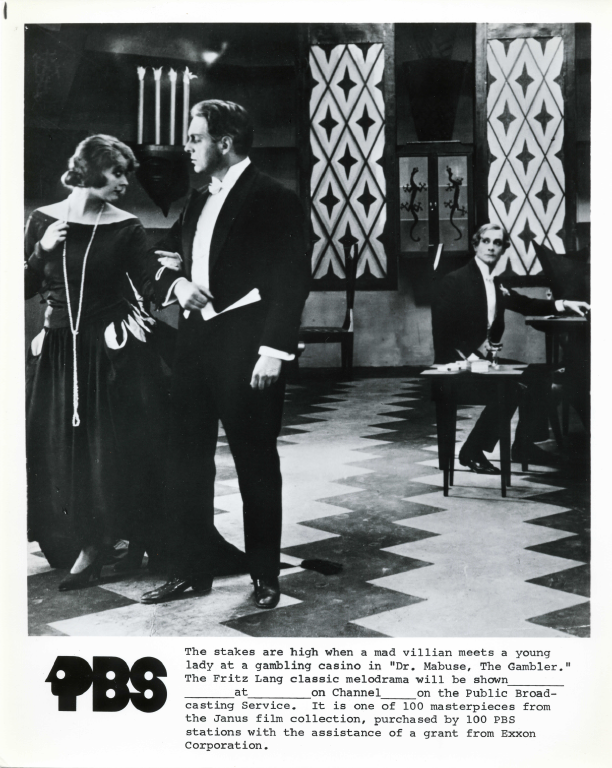 Dr. Mabuse, der Spieler (The shortened 1964 reissue with a score by Konrad Elfers. I’m pretty sure this was the Albuquerque première of Dr. Mabuse in any form.) |
| 19. |
Sat 07 Aug 1976 9:00pm |
 Dr. Mabuse, King of Crime (The shortened 1964 reissue with a score by Konrad Elfers.) | |
| 20. |
Sat 14 Aug 1976 9:00pm |
 The Astonished Heart | |
| 21. |
Sat 21 Aug 1976 9:00pm |
 Spies (This still is from the “Film Odyssey” series. As soon as I can find one from “PBS Movie Theater,” I’ll post it.) | |
| 22. |
Sat 28 Aug 1976 9:00pm |
Winter Light | |
| 23. |
Sat 04 Sep 1976 9:00pm |
 Secrets of Women (1976-09-04-Sat-2100-WNED17. 1977-12-18-Sun-1500-WNED17. 1979-06-29-Fri-1300-WNED17.) | |
| 24. | Sat 11 Sep 1976 |
 [ (This still is from the “Film Odyssey” series. As soon as I can find one from “PBS Movie Theater,” I’ll post it.) | |
| 25. |
Sat 18 Sep 1976 9:00pm |
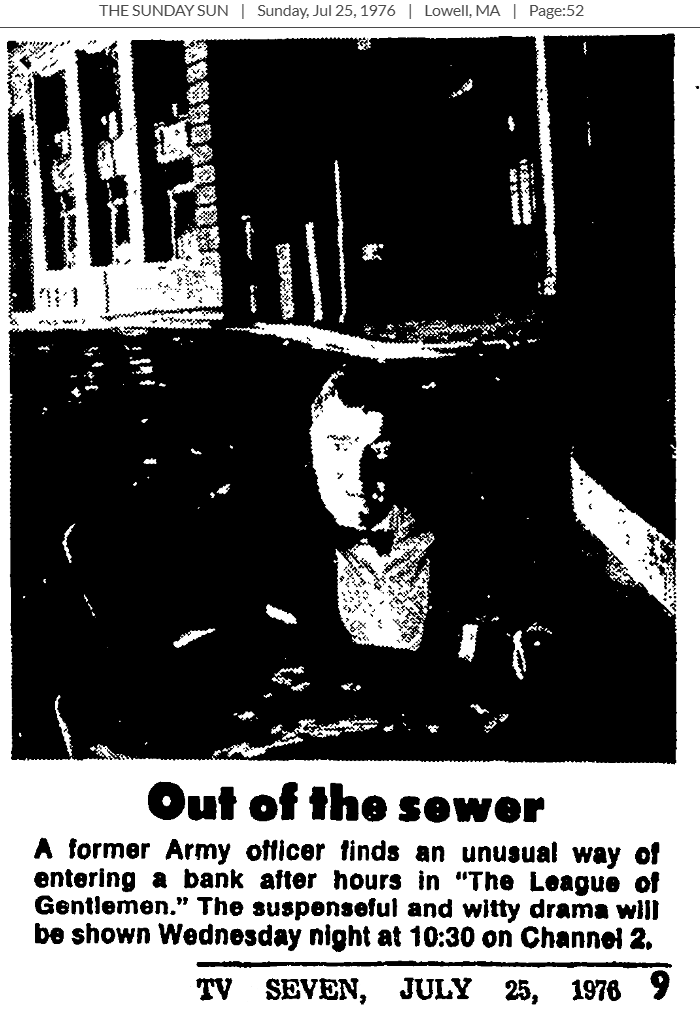 The League of Gentlemen | |
| 26. |
Sat 25 Sep 1976 9:00pm |
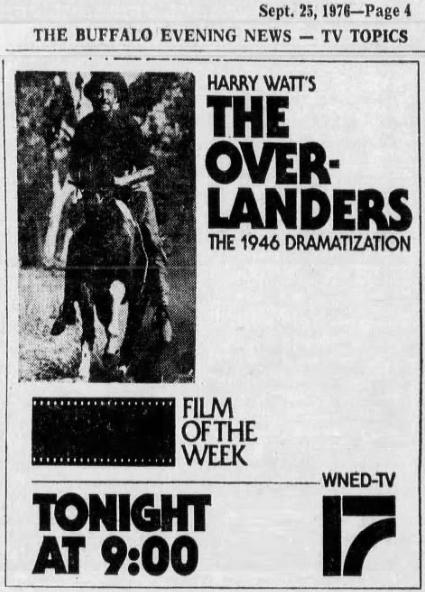 The Overlanders | |
| 27. |
Sat 02 Oct 1976 9:00pm |
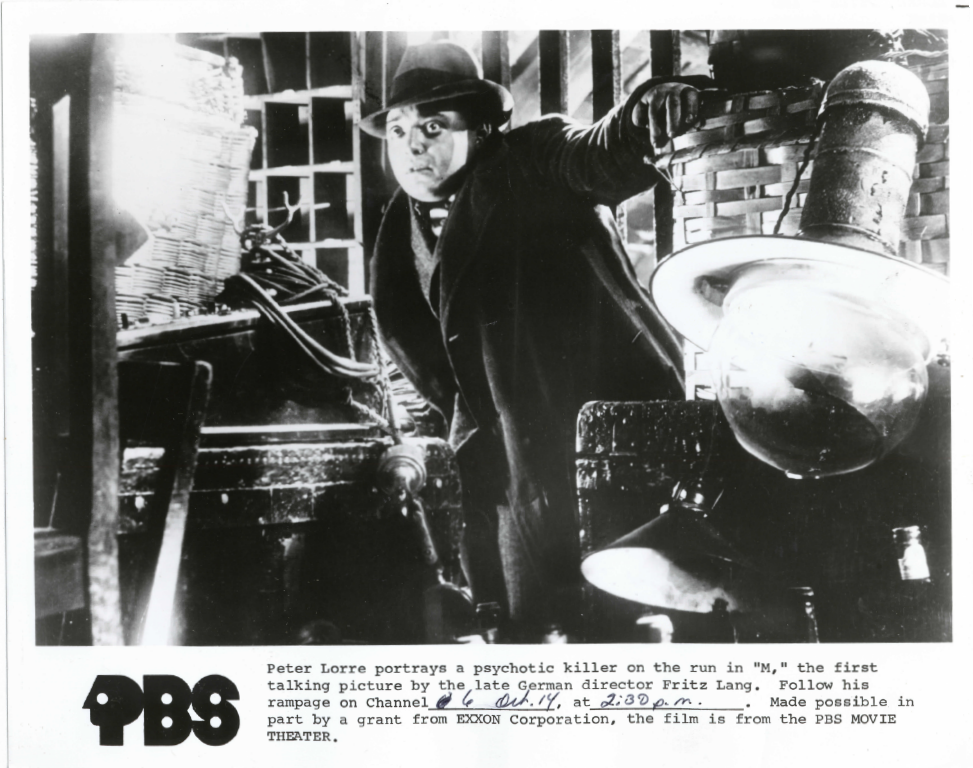 M | |
| 28. |
Sat 09 Oct 1976 9:00pm |
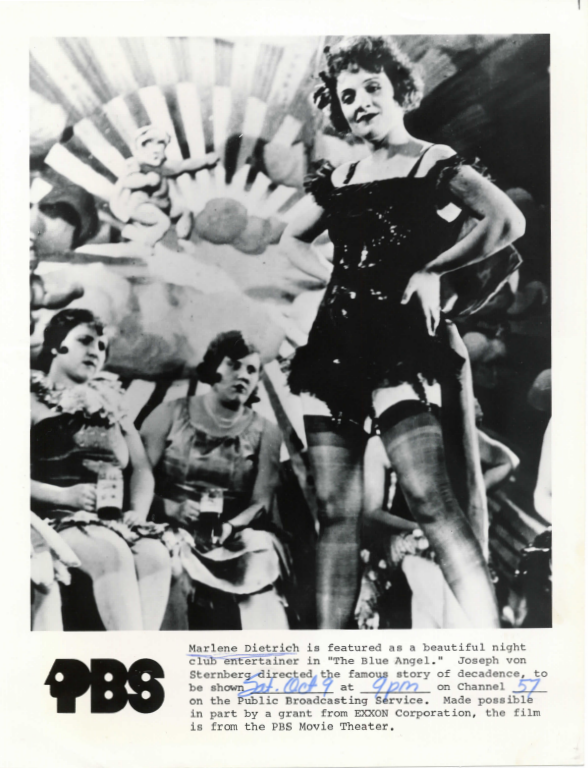 The Blue Angel | |
| 29. |
Tue 12 Oct 1976 9:30pm |
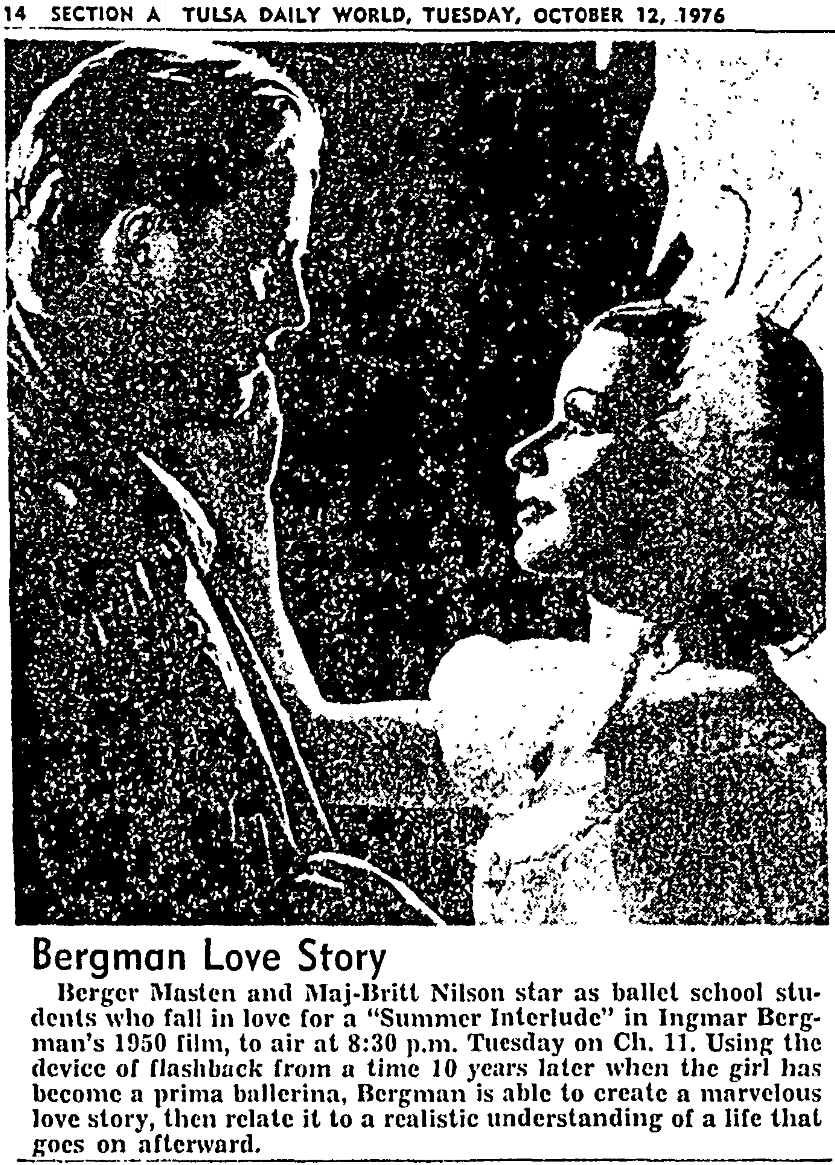 Summer Interlude
Summer Interlude | |
| 30. |
Tue 19 Oct 1976 9:30pm |
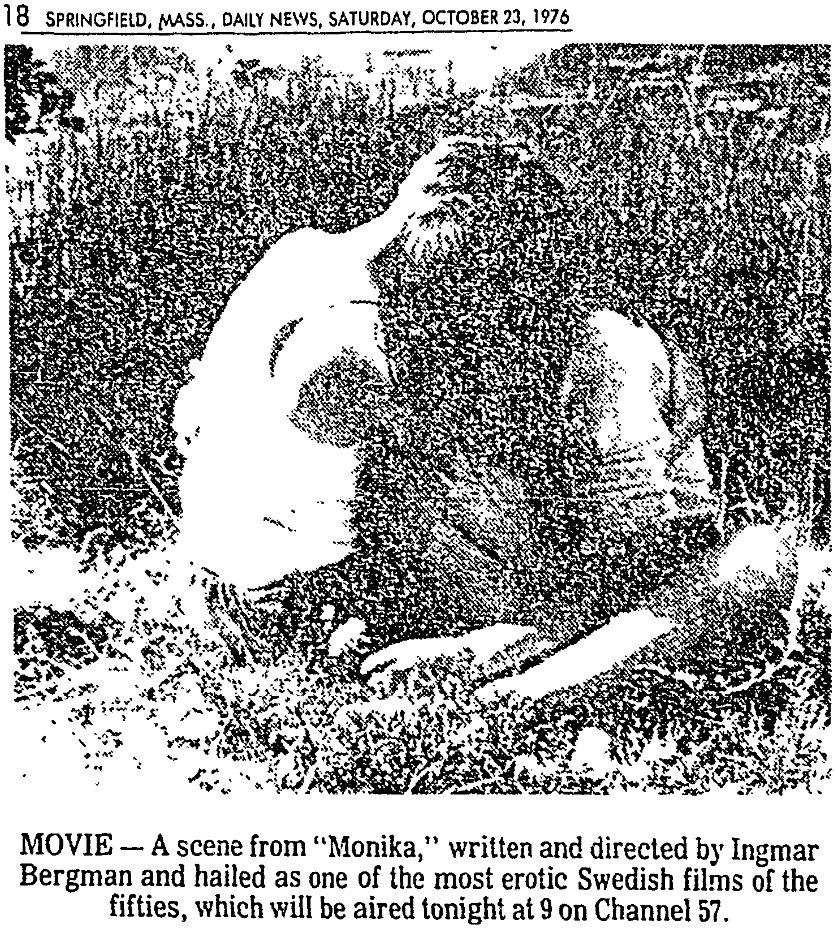 Monika
Monika | |
| 30. |
Sat 23 Oct 1976 10:30pm |
 Monika (repeat)
Monika (repeat) | |
| 31. |
Tue 26 Oct 1976 9:30pm |
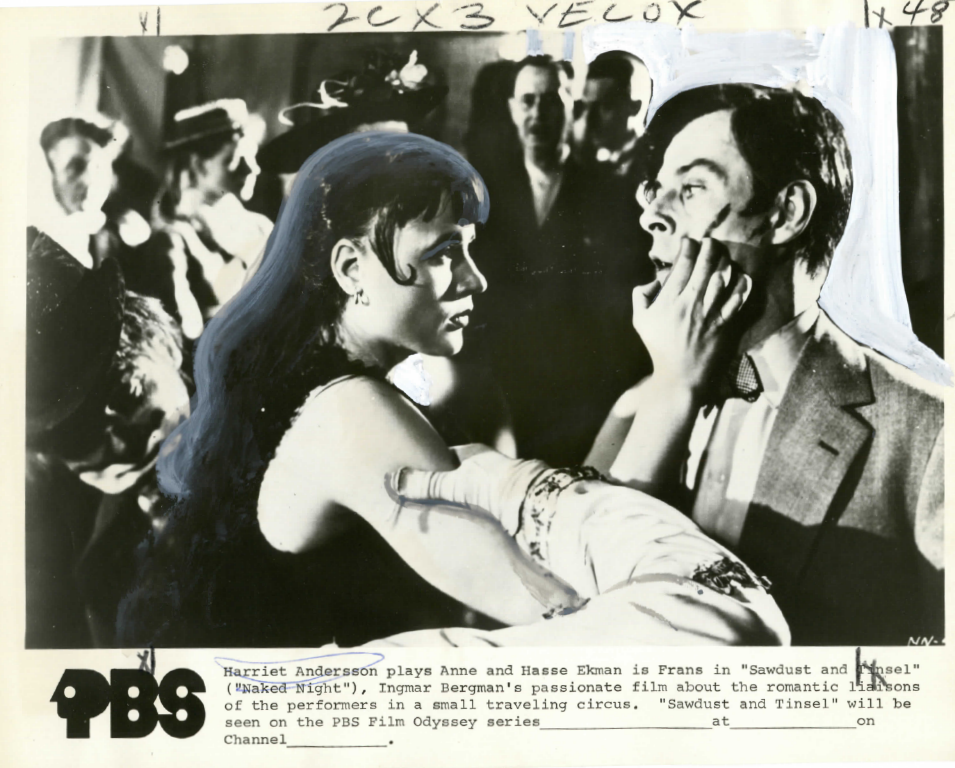 Sawdust and Tinsel (Naked Night) (This still is from the “Film Odyssey” series. As soon as I can find one from “PBS Movie Theater,” I’ll post it.) | |
| 32. |
Tue 02 Nov 1976 9:30pm |
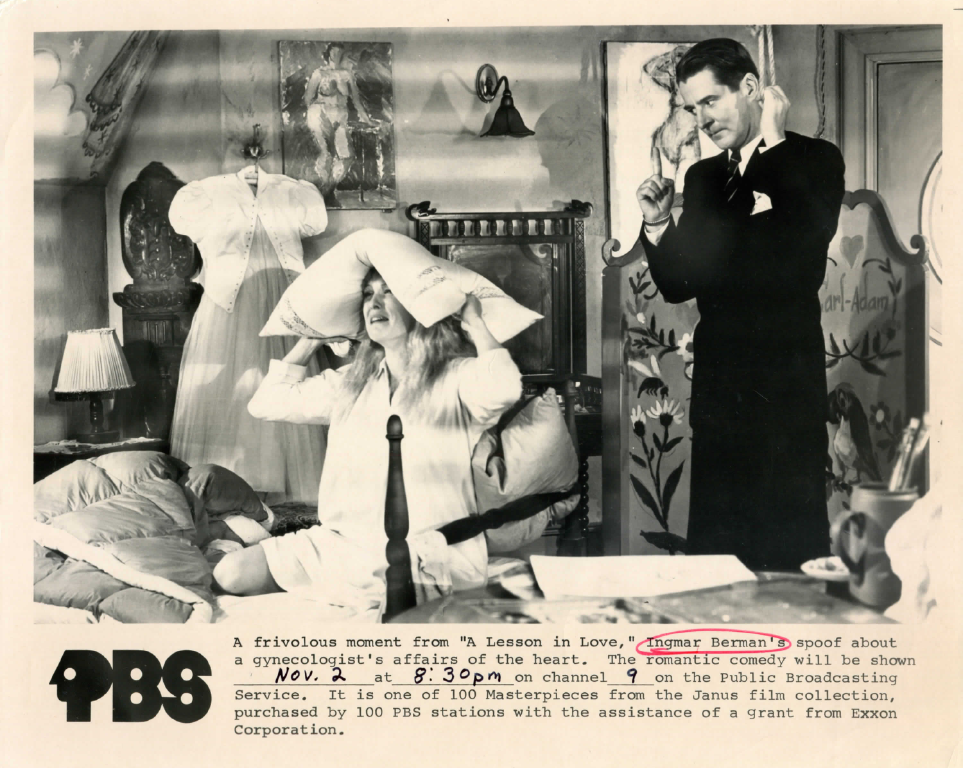 A Lesson in Love | |
| 32. |
Sat 06 Nov 1976 10:30pm |
 A Lesson in Love (repeat) ✓ | |
| 33. |
Tue 09 Nov 1976 9:30pm |
 Dreams | |
| 33. |
Sat 13 Nov 1976 10:30pm |
 Dreams (repeat) | |
| 34. |
Tue 16 Nov 1976 9:30pm |
 Smiles of a Summer Night (This still is from the “Festival ’76” series. As soon as I can find one from “PBS Movie Theater,” I’ll post it.) | |
| 34. |
Sat 20 Nov 1976 10:30pm |
 Smiles of a Summer Night (repeat) ✓ (This still is from the “Festival ’76” series. As soon as I can find one from “PBS Movie Theater,” I’ll post it.) | |
| 35. |
Tue 23 Nov 1976 10:00pm |
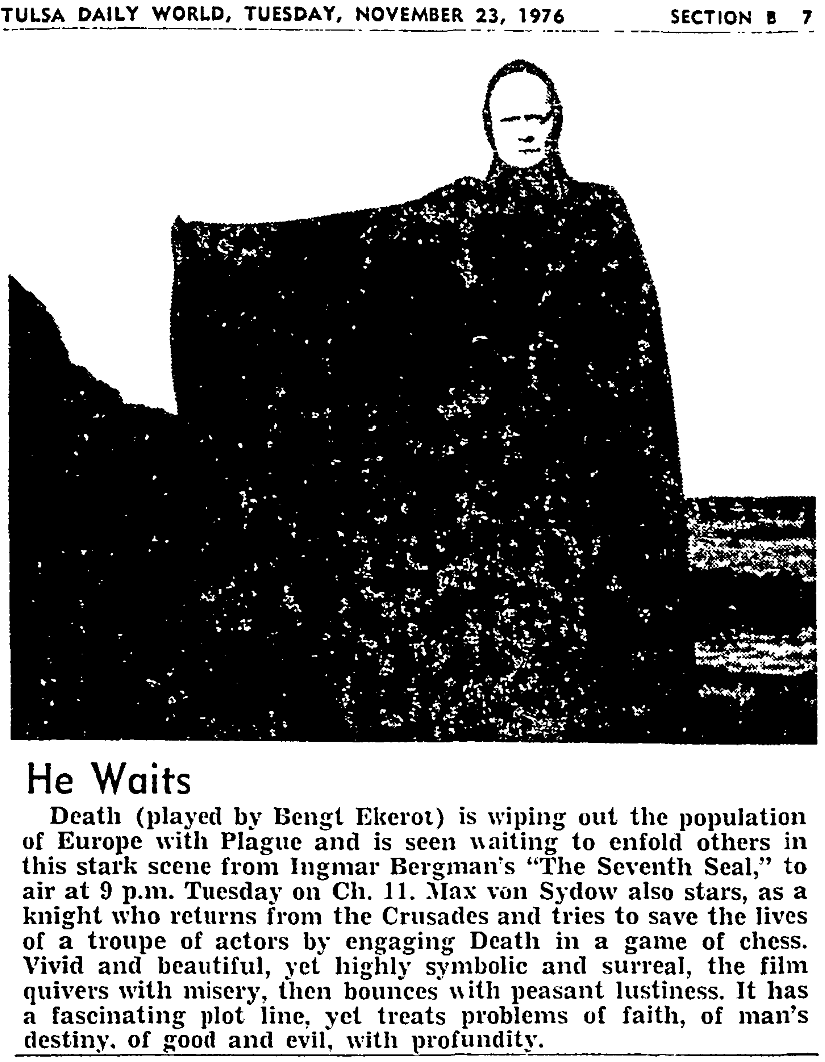 The Seventh Seal (1976-12-31-Fri-1600-WNED17.)
The Seventh Seal (1976-12-31-Fri-1600-WNED17.) | |
| 36. |
Tue 30 Nov 1976 9:30pm |
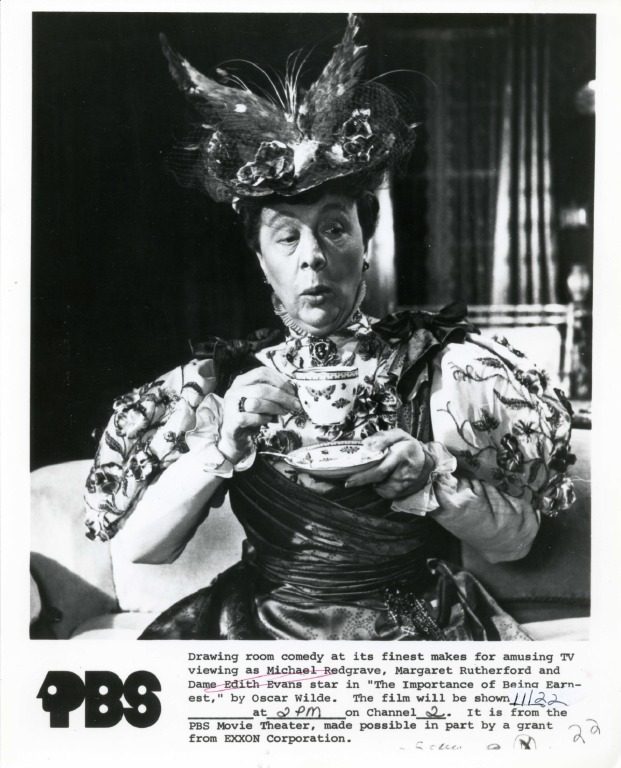 The Importance of Being Earnest | |
| 37. |
Premium Bonus Episode |
Through a Glass Darkly (not shown in Albuquerque; shown on KDIN/11 in Des Moines on 06 Feb 1977, on KBIN/32 in Council Bluffs on 10 Feb 1977, on KCET/9 in Saint Louis on 21 Sep 1977, on WGBY/57 in Springfield on 31 Dec 1977) | |
| 12. |
Tue 07 Dec 1976 9:30pm |
 The Ladykillers (repeat to fill in for Through a Glass Darkly) | |
| 12. |
Sat 11 Dec 1976 10:30pm |
 The Ladykillers (repeat to fill in for Through a Glass Darkly) | |
| 38. |
Tue 14 Dec 1976 9:30pm |
 Waltz of the Toreadors | |
| 39. |
Tue 21 Dec 1976 9:30pm |
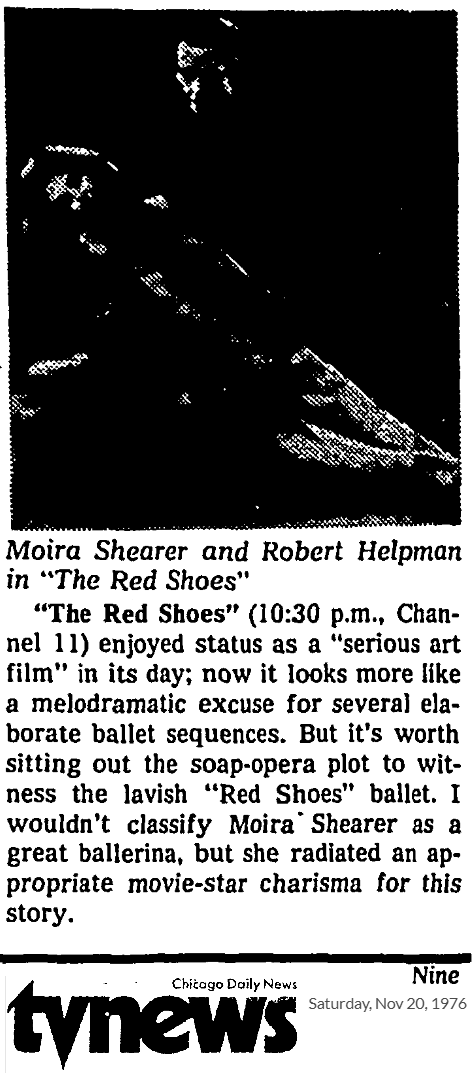 The Red Shoes | |
| 39. |
Sat 26 Dec 1976 10:30pm |
 The Red Shoes (repeat) | |
| 40. |
Tue 28 Dec 1976 9:30pm |
 Richard III | |
| 40. |
Sat 01 Jan 1977 10:30pm |
 Richard III (repeat) | |
|
Excerpted from New Jersey Nightly News; 12/12/1978 at American Archive.
|
|||
| 41. |
Tue 04 Jan 1977 9:30pm |
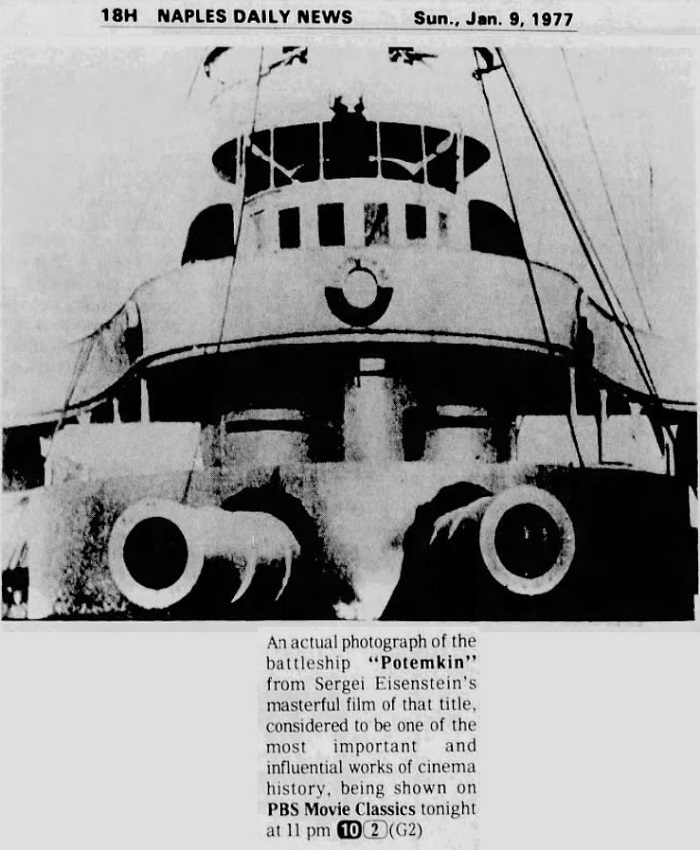 Battleship Potemkin (piano score) ✓ | |
| 41. |
Sat 08 Jan 1977 10:30pm |
 Battleship Potemkin (piano score) (repeat) | |
| 42. | Tue 11 Jan 1977 |
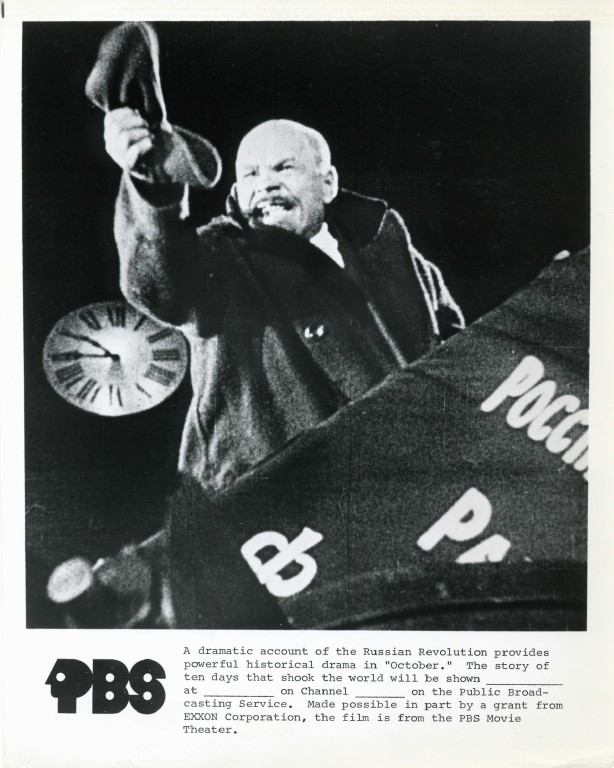 [ | |
| 42. | Sat 15 Jan 1977 |
 [ | |
| 43. | Tue 18 Jan 1977 |
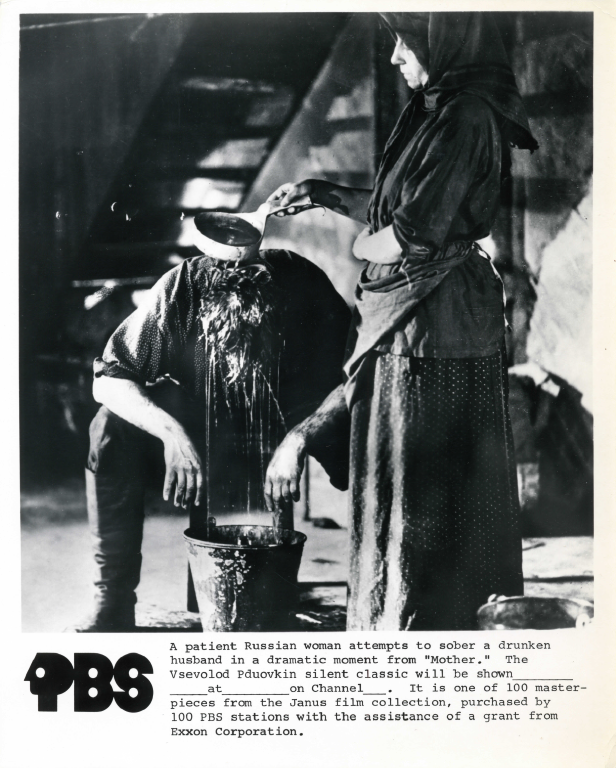 [ | |
| 43. | Sat 22 Jan 1977 |
 [ | |
| 44. |
Sat 29 Jan 1977 10:00pm |
 Storm over Asia | |
| 45. |
Sat 05 Feb 1977 10:00pm |

Earth (stretch printed) ✓ (I seem to recall that it had Russian opening and closing titles rather than Ukrainian titles. I wish I could remember the music and who composed it. I don’t think it was the standard-issue Soviet track. The caption above, which I hope was not in the PBS original press photo, was dead wrong. This was most definitely NOT a Russian film. It was a Ukrainian film. Below is a review that touches my heart, despite repeating that same dreadful error:) 
| |
| 46. |
Sat 12 Feb 1977 10:00pm |
 Alexander Nevsky | |
| 47. | Sat 19 Feb 1977 |
 [ |
|
| 48. | Sat 26 Feb 1977 |
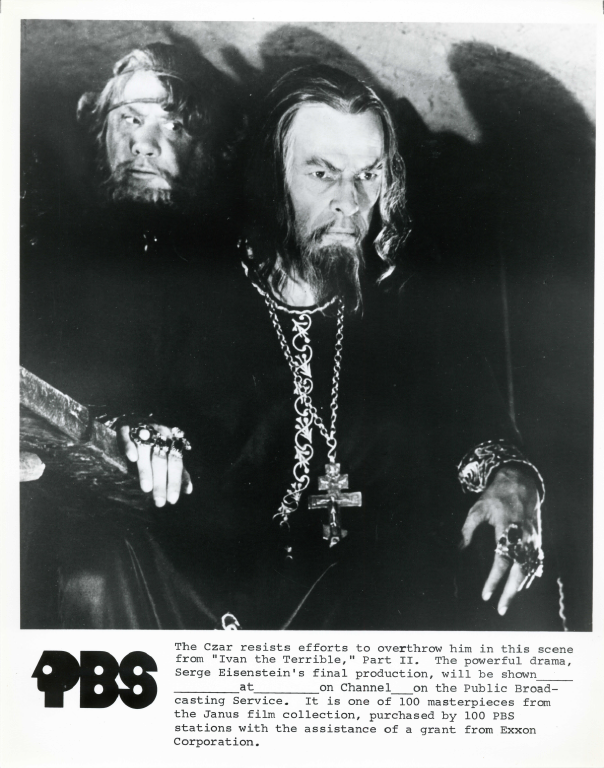 [ | |
| 49. |
Sat 05 Mar 1977 10:00pm |
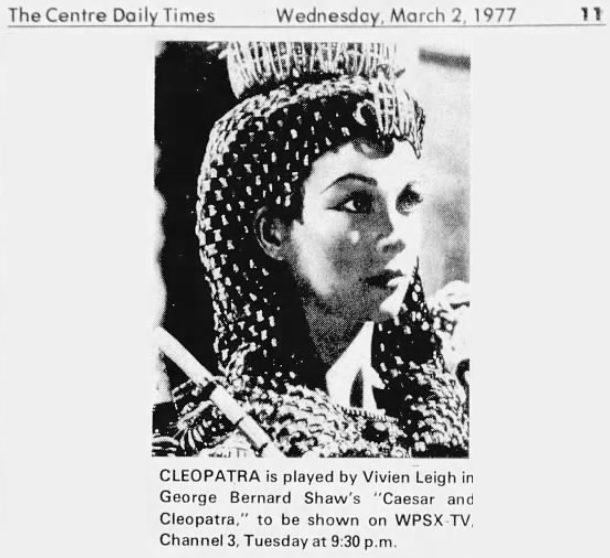 Caesar and Cleopatra | |
| 50. |
Sat 12 Mar 1977 10:00pm |
 Pygmalion (This still is from the “Festival ’76” series. As soon as I can find one from “PBS Movie Theater,” I’ll post it.) | |
| 51. |
Sat 19 Mar 1977 10:30pm |
Major Barbara | |
| 52. |
Sat 26 Mar 1977 10:00pm |
Androcles and the Lion | |
| 53. |
Sat 02 Apr 1977 10:00pm |
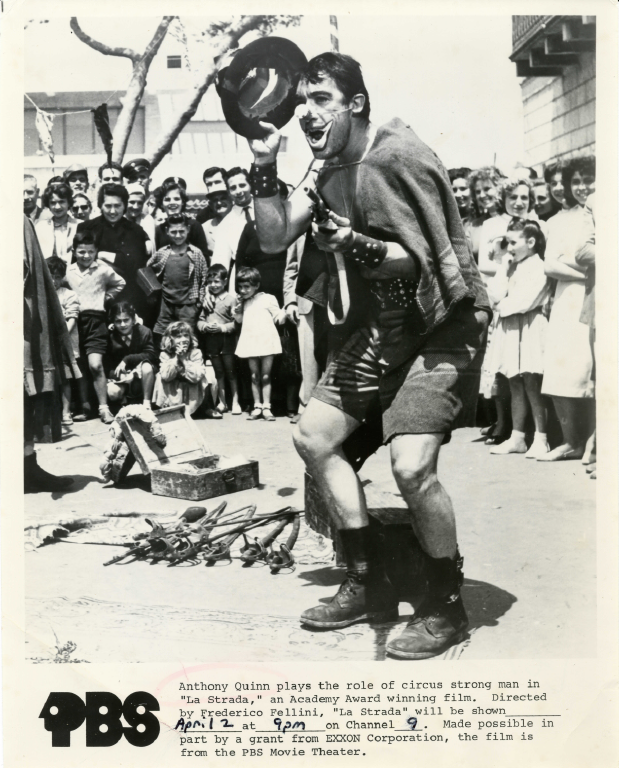 La strada | |
| 54. |
Sat 09 Apr 1977 10:00pm |
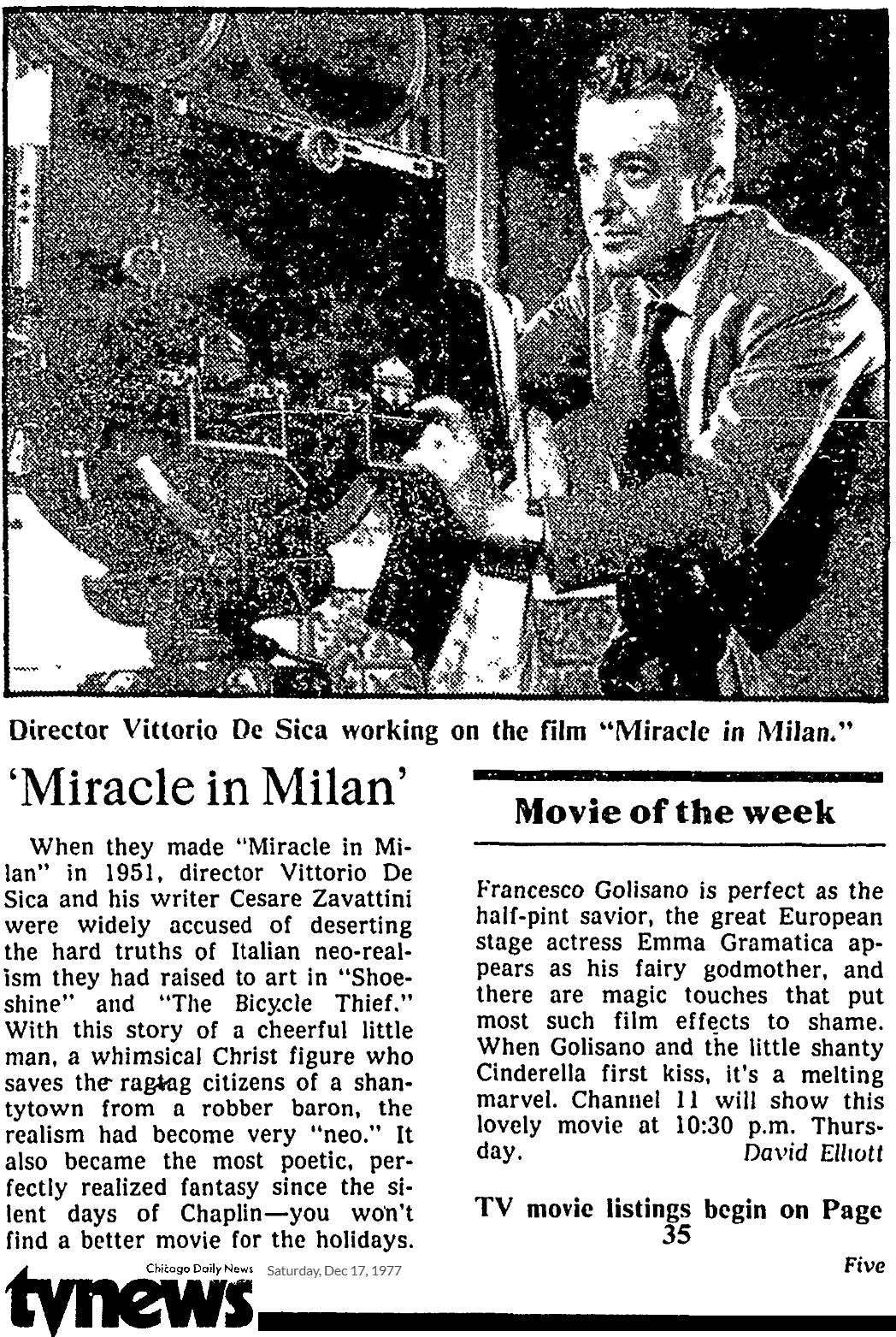 Miracle in Milan | |
| 55. |
Sat 16 Apr 1977 10:00pm |
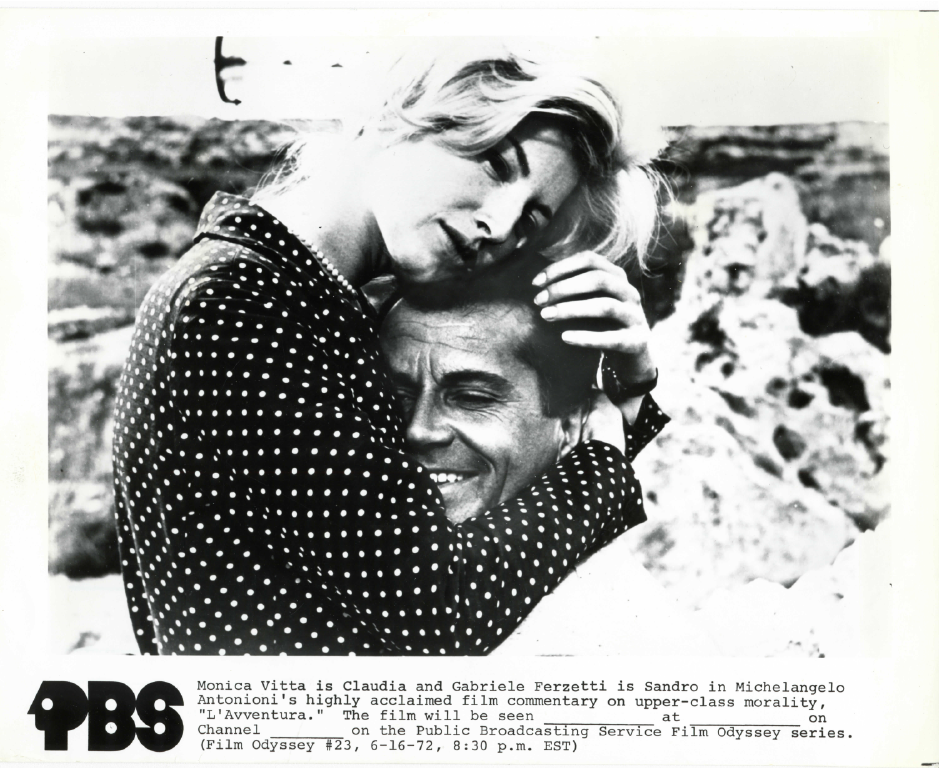 L’avventura (This still is from the “Film Odyssey” series. As soon as I can find one from “PBS Movie Theater,” I’ll post it.) | |
|
Excerpted from New Jersey Nightly News 04/05/1979 at American Archive. Yes, that’s exactly what the captions looked like on the foreign-language films in the series... |
|||
| 56. |
Sat 23 Apr 1977 10:00pm |
 Shoeshine (This still is from the “Festival ’76” series. As soon as I can find one from “PBS Movie Theater,” I’ll post it.) | |
|
Excerpted from New Jersey Nightly News Episode from 04/03/1979 at American Archive. ...Except for this one. My oh my. These captions were not made on a Chiron. They were printed directly onto the film. I guess that Sarson and his team let this go because the captions were so large and so high on the frame that they didn’t feel a need to do them all over again. |
|||
| 57. |
Sat 30 Apr 1977 10:00pm |
L’eclisse | |
| 58. |
Sat 07 May 1977 10:00pm |
Umberto D. | |
| 59. |
Sat 14 May 1977 10:00pm |
 The Cabinet of Dr. Caligari | |
| 60. |
Sat 21 May 1977 10:00pm |
  Metropolis ✓ (The illustration is my forgery, based upon display ads in newspapers.) | |
| 61. |
Sat 28 May 1977 10:30pm |
Nosferatu ✓ | |
| 62. |
Sat 04 Jun 1977 10:00pm |
 Queen of Spades | |
| 63. |
Sat 11 Jun 1977 10:30pm |
The Rocking Horse Winner | |
| 64. |
Premium Bonus Episode |
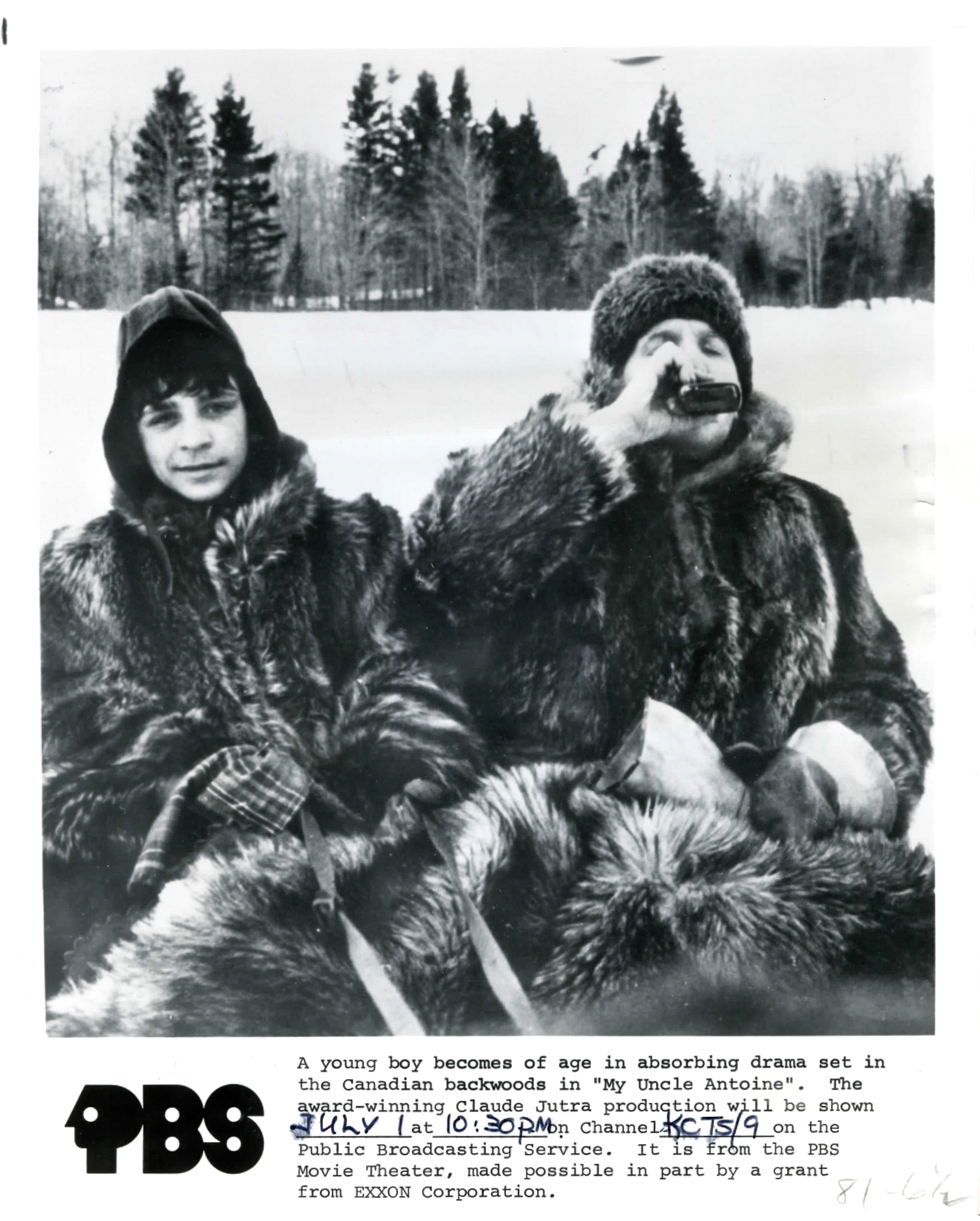 My Uncle Antoine (not shown in Albuquerque; shown on KLRN/9 in San António on 19 Sep 1977) | |
| 16. |
Sat 18 Jun 1977 10:00pm |
The Man in the White Suit (repeat, presumably to fill in for My Uncle Antoine) | |
| 65. |
Sat 25 Jun 1977 10:00pm |
Lust for Evil (Purple Noon) | |
| 66. |
Sat 02 Jul 1977 10:00pm |
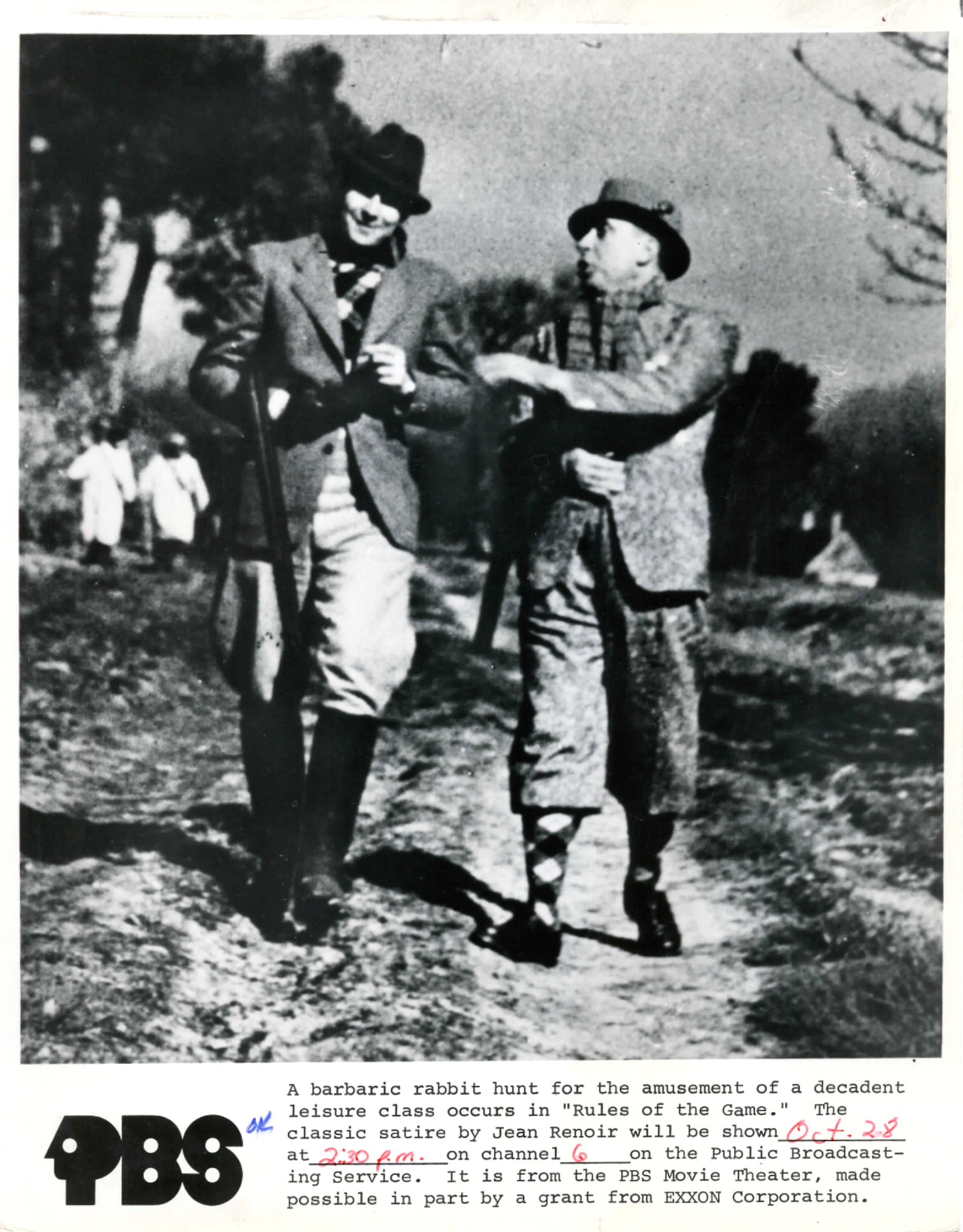 The Rules of the Game | |
| 67. |
Sat 09 Jul 1977 10:30pm |
 The Soft Skin (This still is from the “Festival ’76” series. As soon as I can find one from “PBS Movie Theater,” I’ll post it.) | |
| 68. |
Sat 16 Jul 1977 10:00pm |
Jules and Jim | |
| 69. |
Sat 23 Jul 1977 10:00pm |
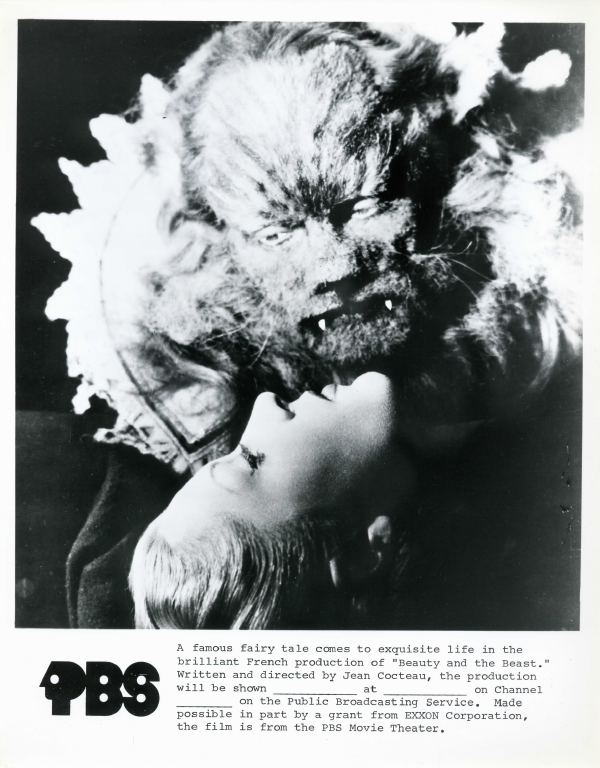 Beauty and the Beast ✓ | |
| 70. |
Sat 30 Jul 1977 10:00pm |
Orpheus | |
| 71. |
Sat 06 Aug 1977 10:00pm |
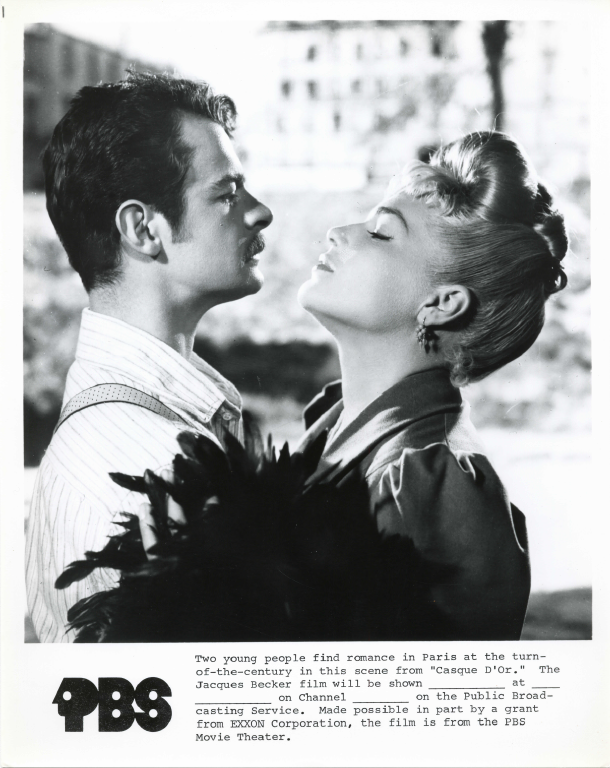 Casque d’ or | |
| 72. |
Premium Bonus Episode |
 The Cranes Are Flying (not shown in Albuquerque; shown on KBGL/10 in Pocatello on 01 Mar 1976) | |
| 24. |
Sat 13 Aug 1977 10:00pm |
 Grand Illusion ✓ (presumably scheduled to fill in for The Cranes Are Flying) (This still is from the “Film Odyssey” series. As soon as I can find one from “PBS Movie Theater,” I’ll post it.) | |
| 73. |
Sat 20 Aug 1977 10:00pm |
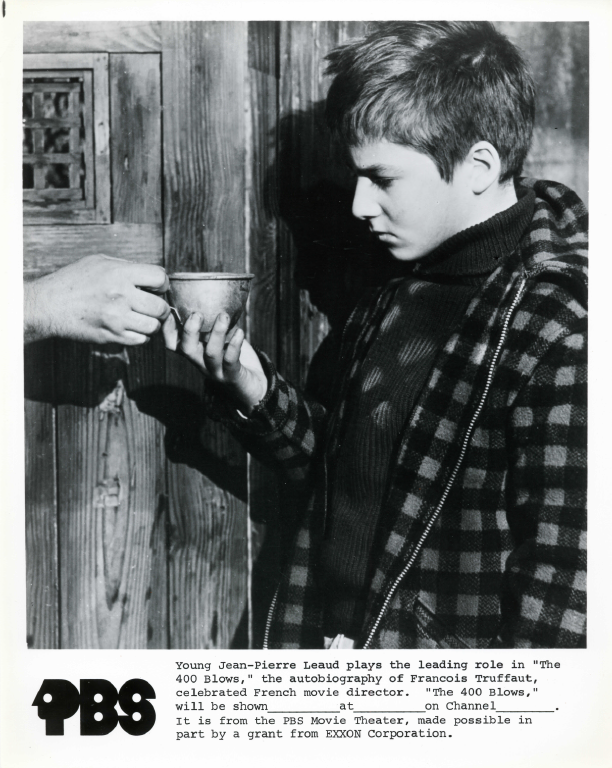 The 400 Blows | |
| 74. |
Premium Bonus Episode |
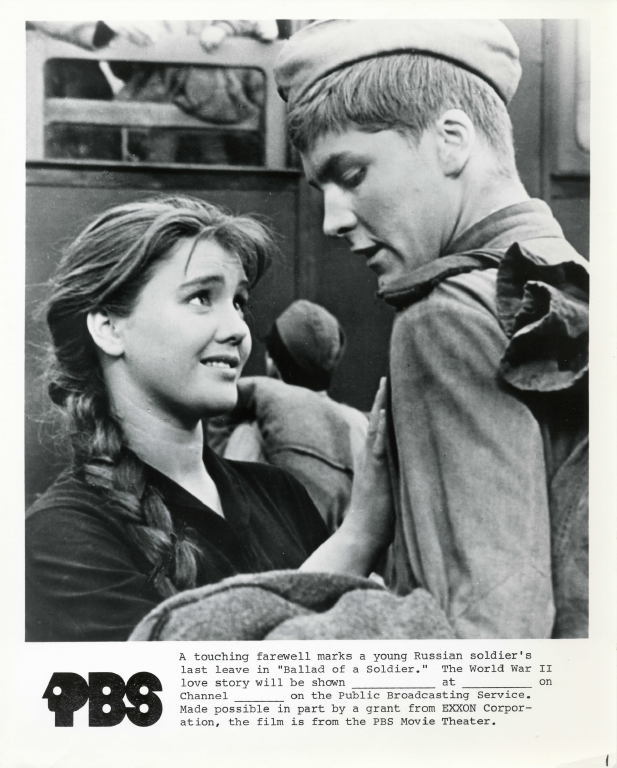 Ballad of a Soldier (not shown in Albuquerque; shown on KBGL/10 in Pocatello on 08 Mar 1976) | |
| 10. |
Sat 27 Aug 1977 10:00pm |
 Kind Hearts and Coronets (repeat, presumably to fill in for Ballad of a Soldier) | |
| 75. |
Premium Bonus Episode |
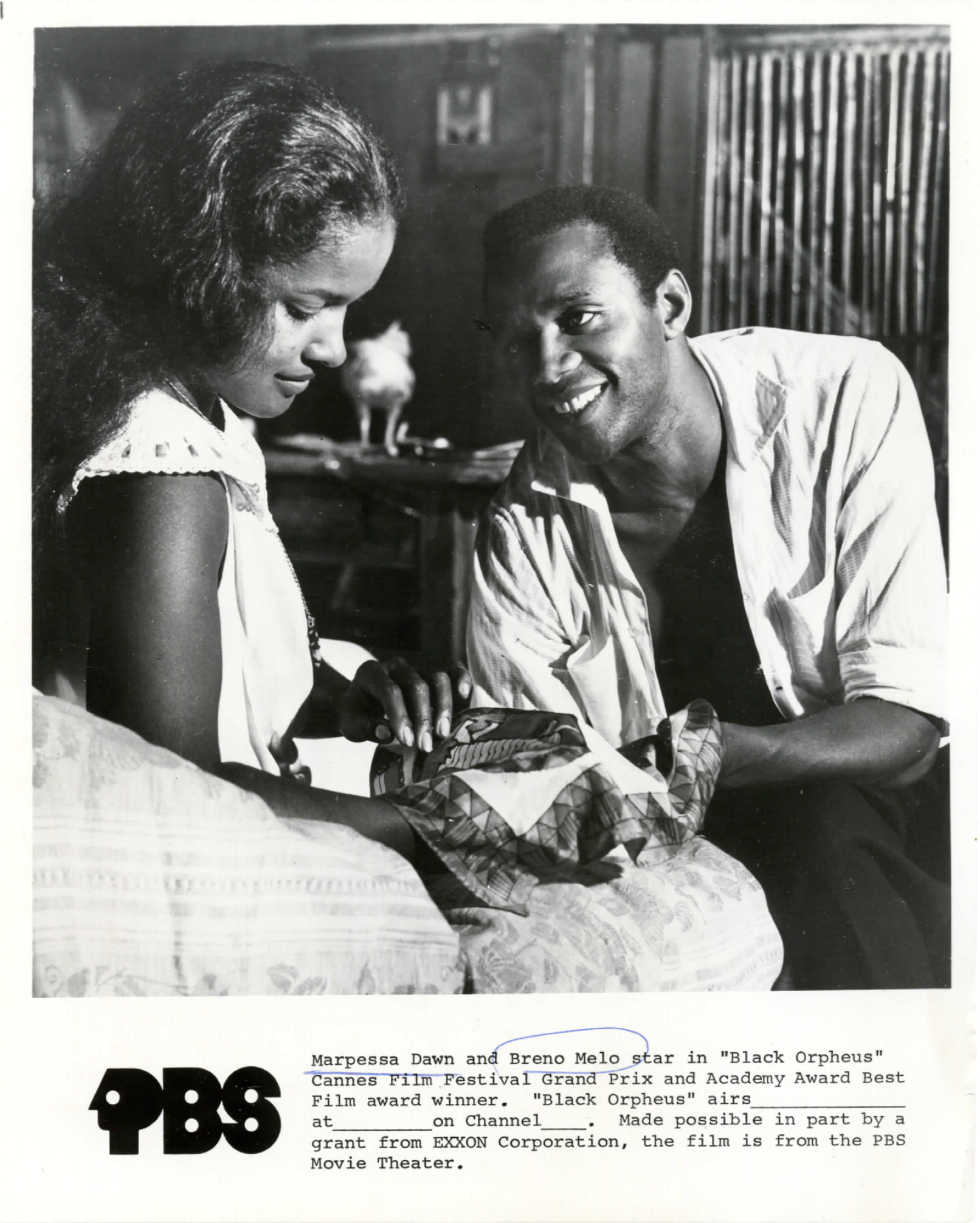 Black Orpheus (not shown in Albuquerque; shown on KENW/3 in Portales on 19 Mar 1976) | |
| 14. |
Sat 03 Sep 1977 10:00pm |
 Last Holiday (repeat, presumably to fill in for Black Orpheus) | |
| 76. |
Sat 10 Sep 1977 10:00pm |
Brief Encounter | |
| 77. |
Premium Bonus Episode |
The Passion of Joan of Arc (not shown in Albuquerque; shown on KLRN/9 in San António on 28 Dec 1977)) | |
| 05. |
Sat 17 Sep 1977 10:00pm |
 Hobson’s Choice (repeat, presumably to fill in for The Passion of Joan of Arc) | |
| 78. |
Premium Bonus Episode |
The Silence (not shown in Albuquerque; shown on KHET/11 in Honolulu on 24 Feb 1978) | |
| 07. |
Sat 24 Sep 1977 10:30pm |
 The Browning Version (repeat, presumably to fill in for The Silence) | |
| 79. |
Sat 01 Oct 1977 10:00pm |
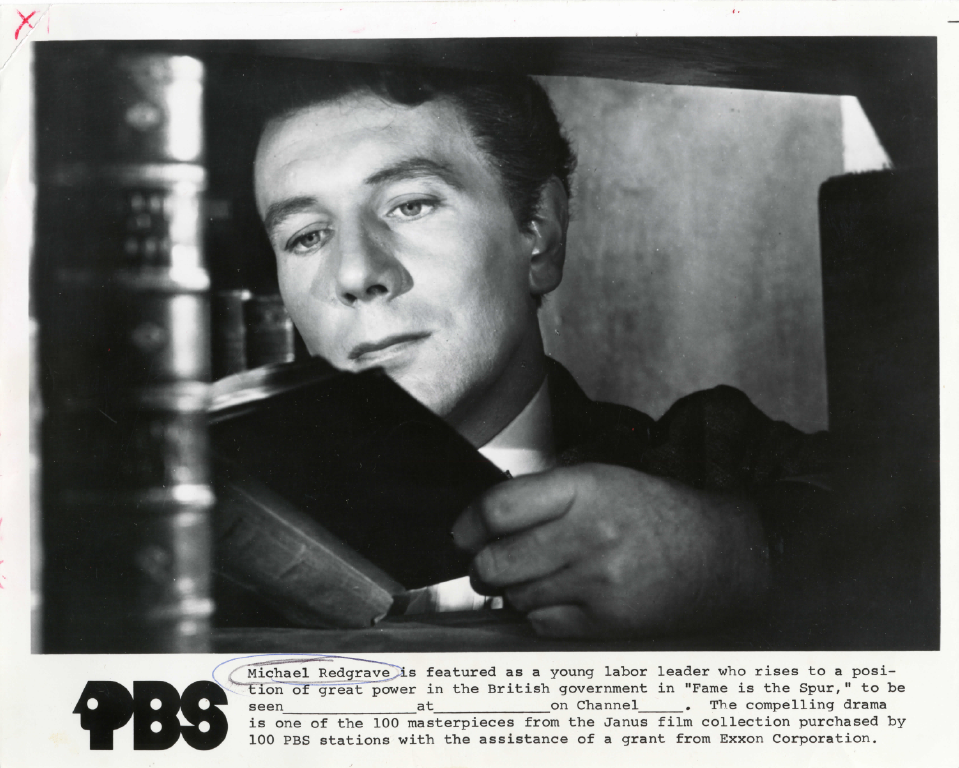 Fame Is the Spur | |
| 80. |
Sat 08 Oct 1977 10:00pm |
Our Daily Bread ✓ | |
| 81. |
Sat 15 Oct 1977 10:00pm |
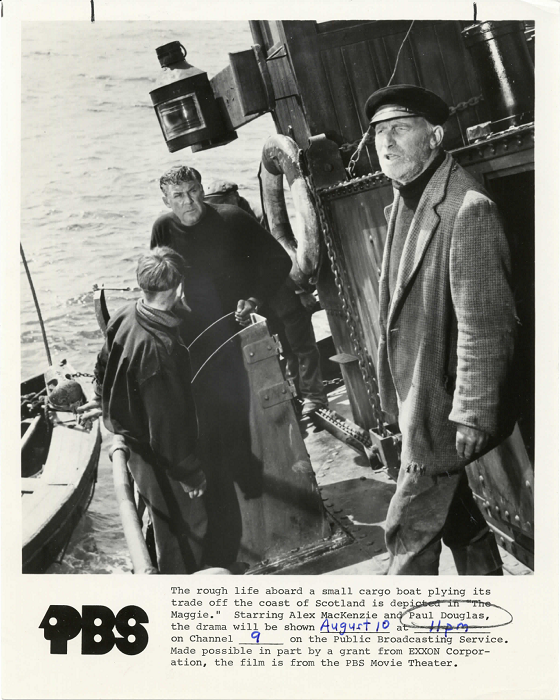 The Maggie | |
| 82. |
Sat 22 Oct 1977 10:00pm |
 The Servant | |
| 83. |
Sat 29 Oct 1977 11:00pm |
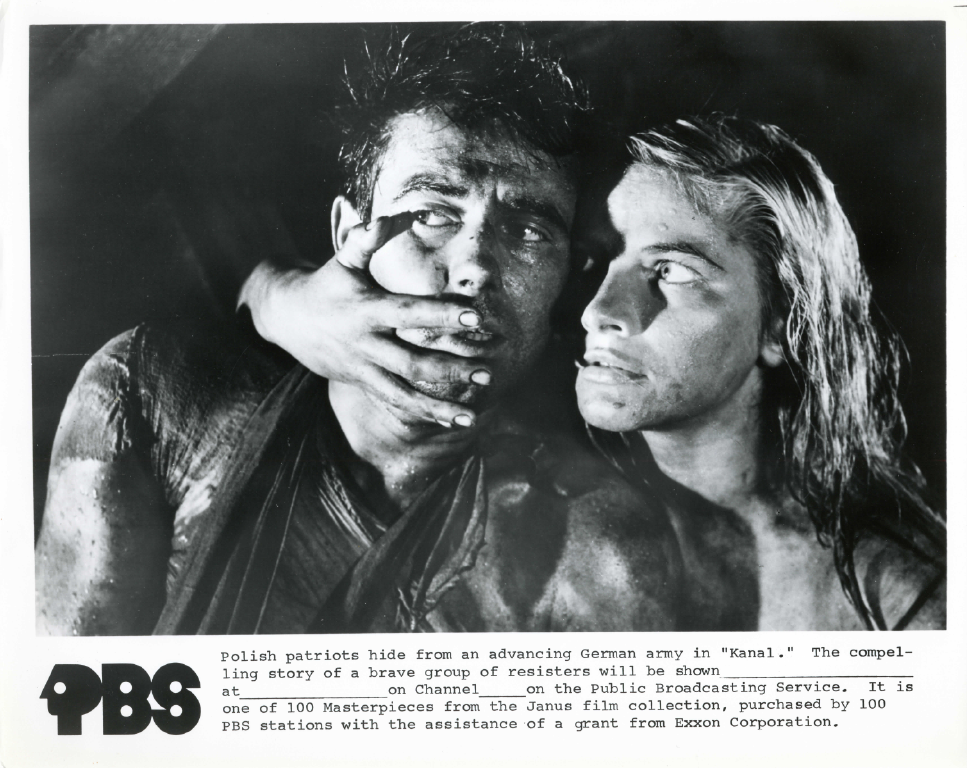 Kanal | |
| 84. |
Sat 05 Nov 1977 10:30pm |
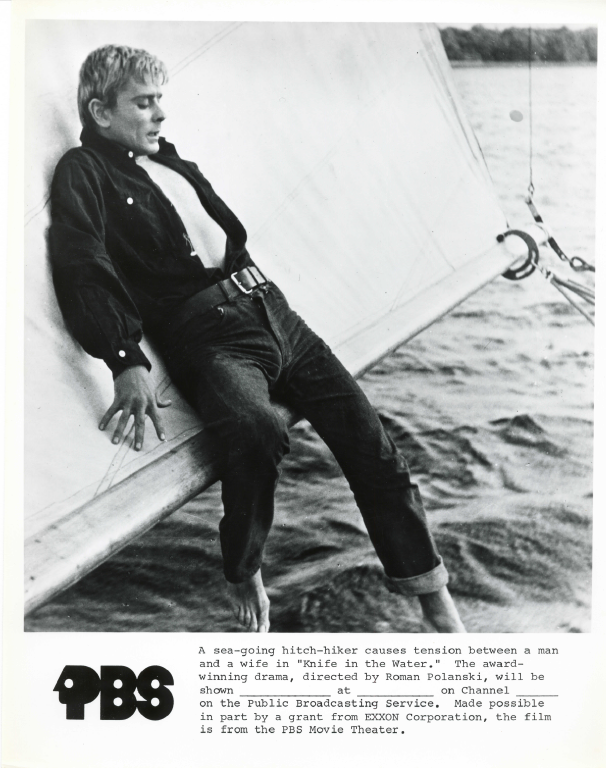 Knife in the Water | |
| 85. |
Sat 12 Nov 1977 10:00pm |
Barrier | |
| 86. |
Sat 19 Nov 1977 10:00pm |
Miss Julie | |
| 87. |
Sat 26 Nov 1977 10:00pm |
Kameradschaft ✓ | |
| 88. |
Premium Bonus Episode |
The Demi-Paradise (not shown in Albuquerque; shown on KAET/8 in Phoenix on 13 Jan 1979, on WOSU/34 in Columbus on 04 Jul 1979) | |
| 28. |
Sat 03 Dec 1977 10:00pm |
 The Blue Angel (repeat, presumably to fill in for The | |
| 89. |
Sat 10 Dec 1977 10:00pm |
 Forbidden Games (dubbed, at least on WGBY/57 in Springfield) | |
| 90. |
Premium Bonus Episode |
Great Expectations (not shown in Albuquerque;
shown on WGBY/12 in Springfield on
11 Mar 1978,
on WPBT/2 in Miami on
11 Mar 1978,
on WQED/13 in Pittsburgh on
13 Mar 1978,
on KTWU/11 in Topeka on
29 May 1978,
on WENH/11 in Portland ME on
17 Jun 1978.
This seems to have been licensed both for “PBS Movie Theater” and for “Festival ’78.”)   | |
| 27. |
Sat 17 Dec 1977 10:00pm |
 M (repeat, presumably to fill in for Great Expectations) | |
| 91. |
Sat 24 Dec 1977 10:00pm |
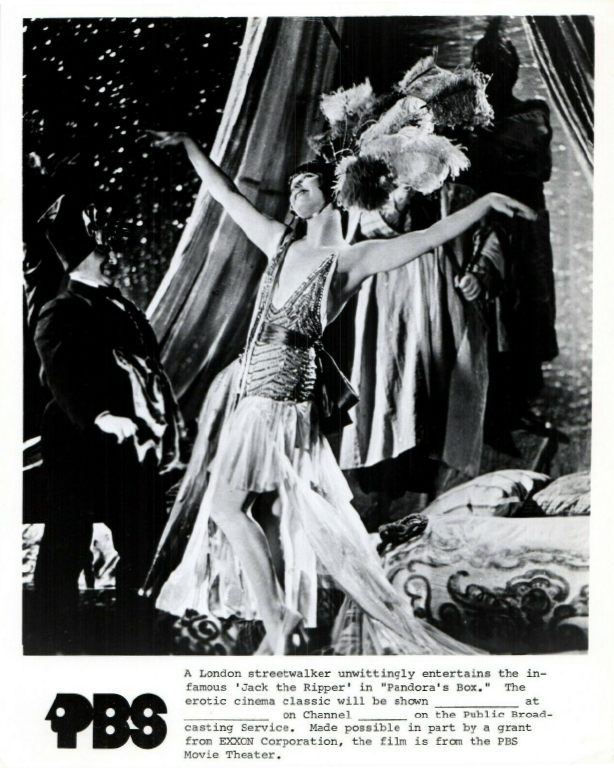 Pandora’s Box ✓ | |
| 92. |
Sat 31 Dec 1977 10:00pm |
 The Last Laugh ✓ (This still is from the “Film Odyssey” series. As soon as I can find one from “PBS Movie Theater,” I’ll post it.) | |
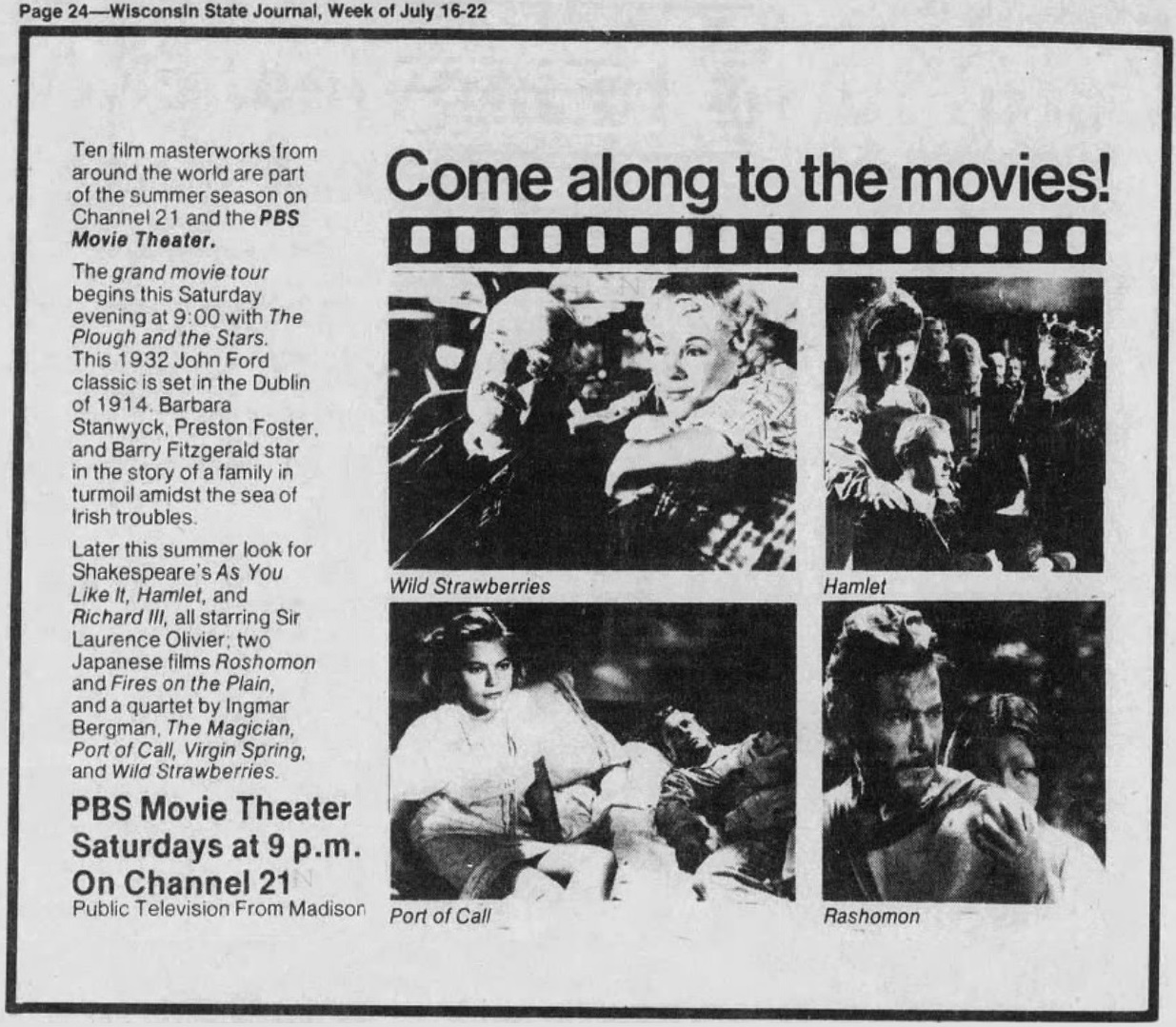 “PBS Movie Theater” went on hiatus at the end of 1977, but then, in the summer, the leftovers arrived. |
| 93. |
Sat 22 Jul 1978 10:00pm |
The Plough and the Stars |
| 94. |
Sat 29 Jul 1978 10:00pm |
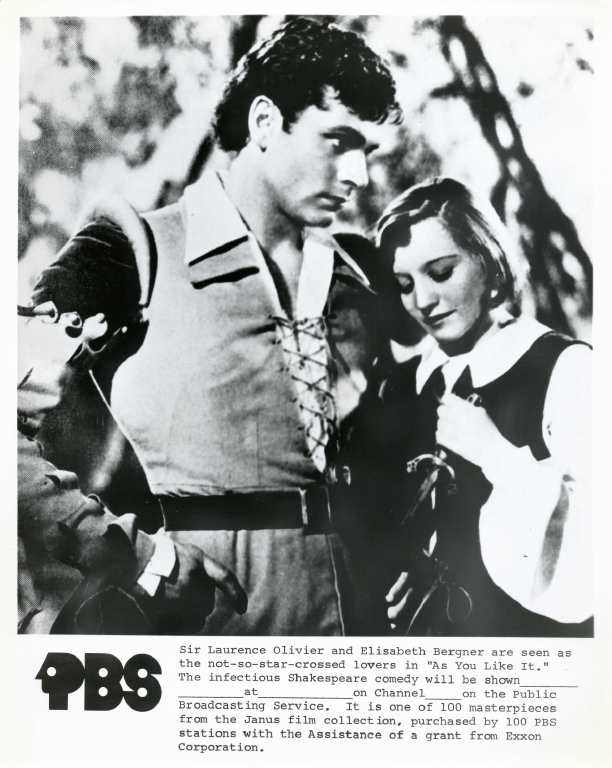 As You Like It |
| 95. |
Sat 05 Aug 1978 10:00pm |
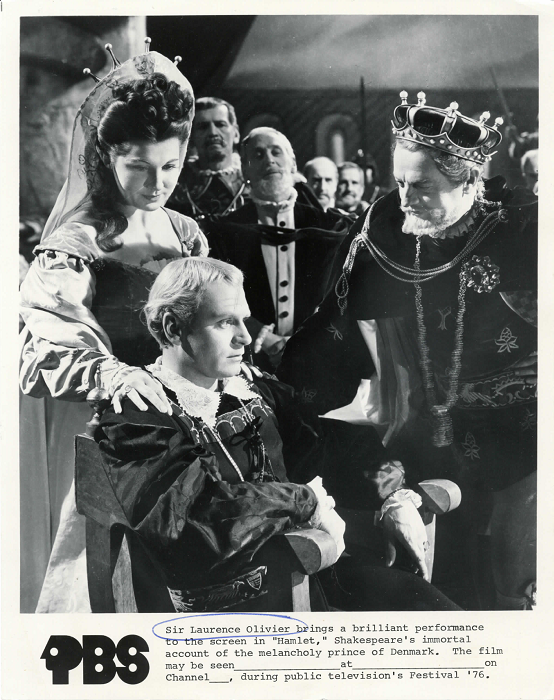 Hamlet (This still is from the “Festival ’76” series. As soon as I can find one from “PBS Movie Theater,” I’ll post it.) |
| 40. |
Sat 12 Aug 1978 10:00pm |
 Richard III (repeat) |
| 96. |
Sat 26 Aug 1978 11:00pm |
 Rashomon |
| 97. |
Sat 02 Sep 1978 10:00pm |
Fires on the Plain |
| 98. |
Sat 09 Sep 1978 10:00pm |
The Magician ✓ (I’m pretty sure this was dubbed) |
| 99. |
Sat 16 Sep 1978 10:00pm |
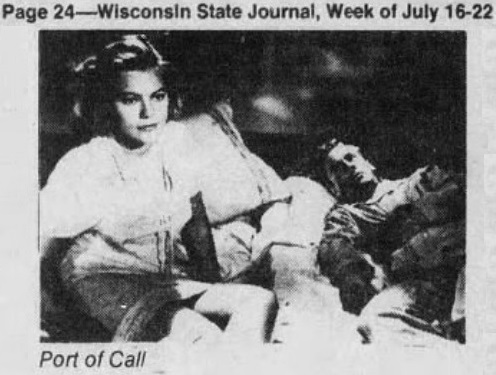 Port of Call |
 | ||
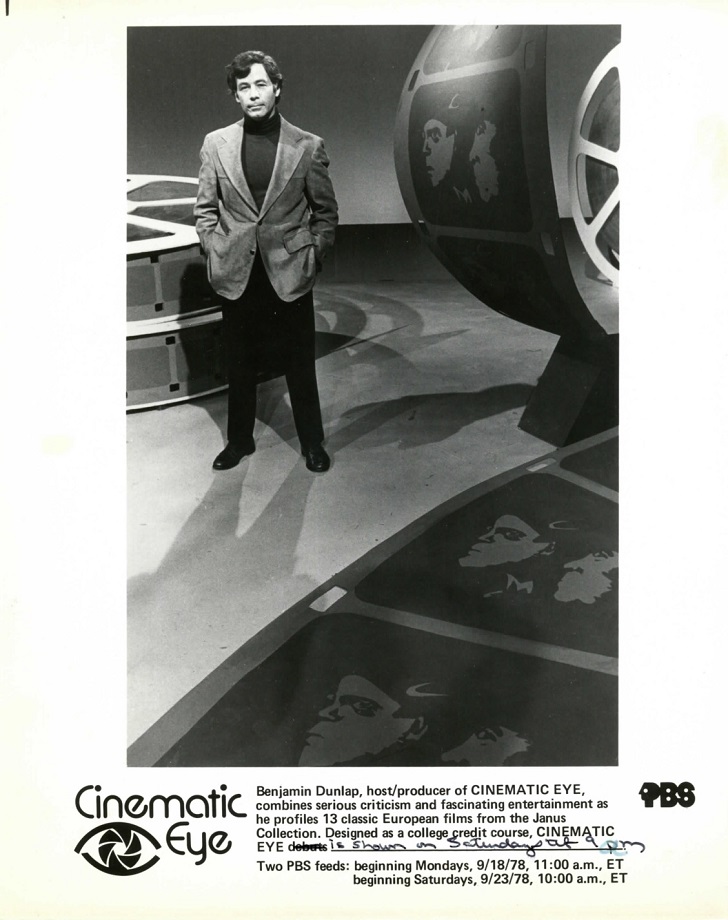 | ||

| ||
|
I misunderstood the above article for years.
When South Carolina Educational Television Network and the University of South Carolina licensed
“PBS Movie Theater,” they deleted the series opening and instead called the series “Cinematic Eye.”
They hired Benjamin Dunlap to record a | ||
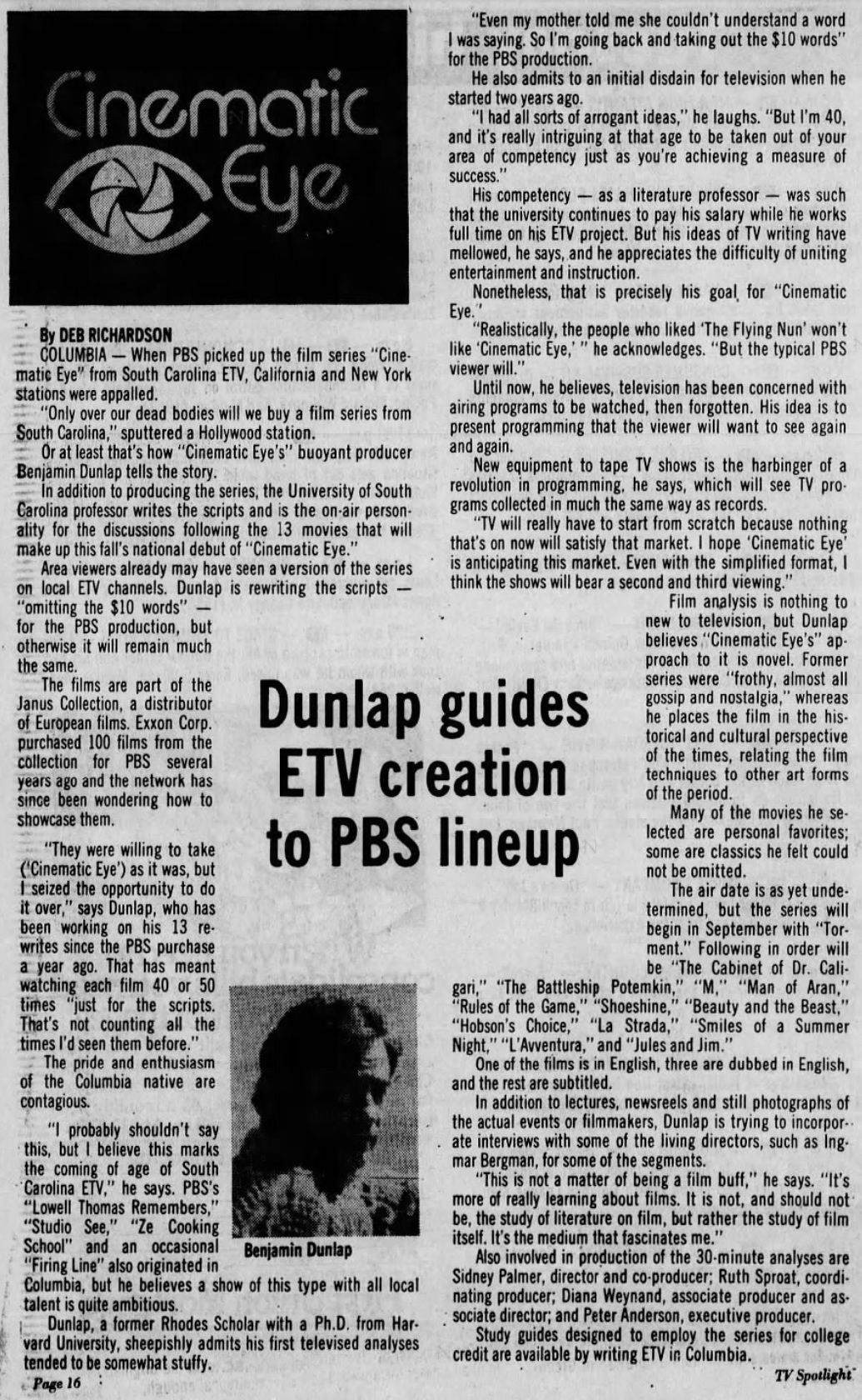
| ||
| 100. |
Sat 23 Sep 1978 10:00am |
 CINEMATIC EYE: Torment (dubbed) ✓ |
| 101. |
Sat 23 Sep 1978 10:00pm |
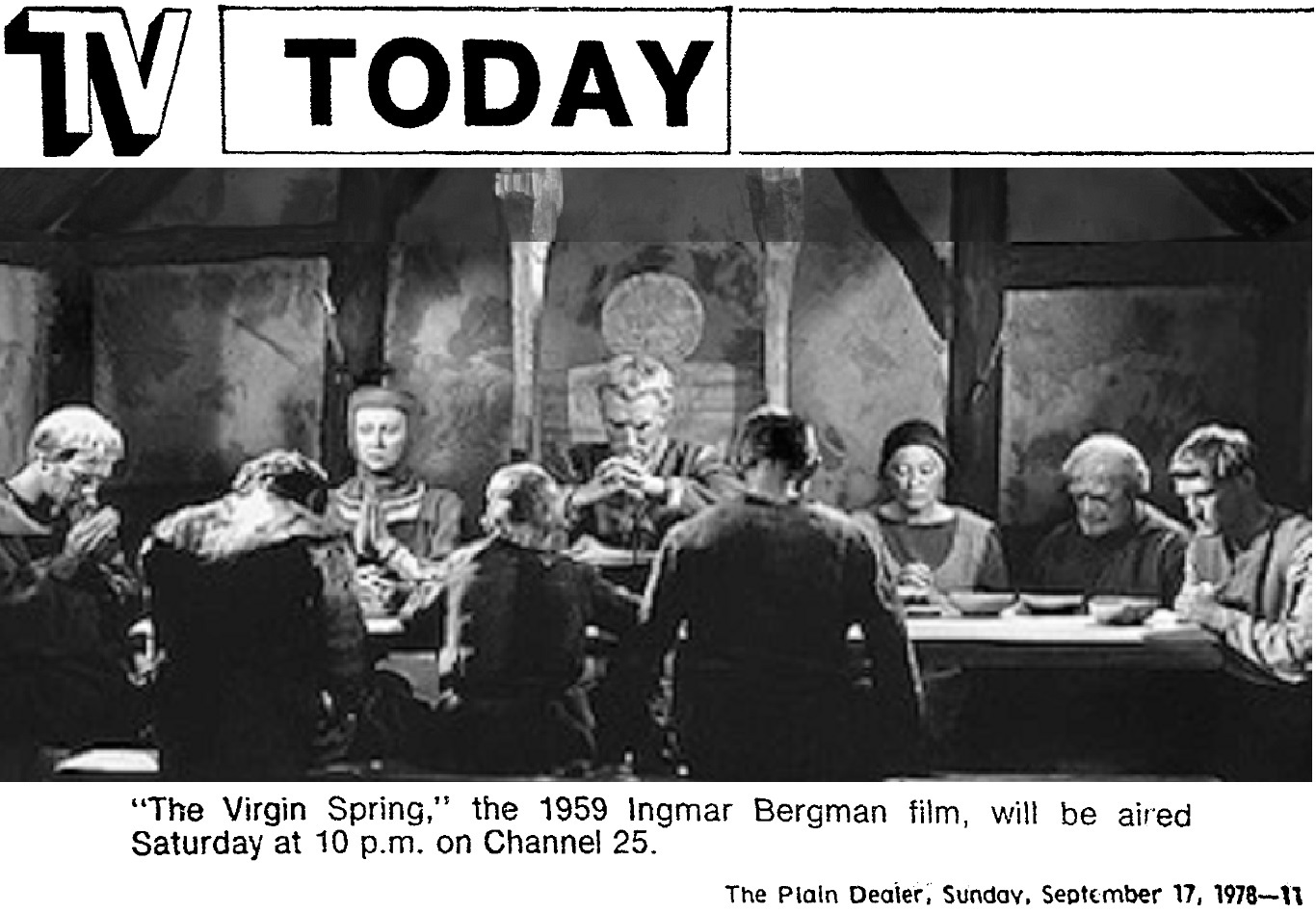 The Virgin Spring ✓ |
| 59. |
Sat 30 Sep 1978 10:00am |
 CINEMATIC EYE: The Cabinet of Dr. Caligari (repeat) ✓ |
| 102. |
Sat 30 Sep 1978 10:00pm |
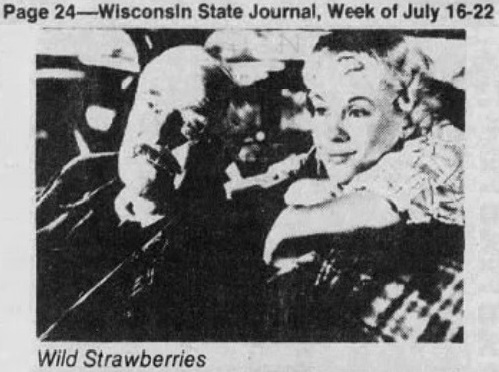 Wild Strawberries ✓ |
| 41. |
Sat 07 Oct 1978 10:00am |
 CINEMATIC EYE: Battleship Potemkin (piano score) (repeat) ✓ |
| 27. |
Sat 14 Oct 1978 10:00am |
 CINEMATIC EYE: M (repeat) ✓ |
| 09. |
Sat 21 Oct 1978 10:00am |
CINEMATIC EYE: Man of Aran (repeat) ✓ |
| 66. |
Sat 28 Oct 1978 10:00am |
 CINEMATIC EYE: The Rules of the Game (repeat) |
| 56. |
Sat 04 Nov 1978 10:00am |
 CINEMATIC EYE: Shoeshine (repeat) ✓ (This still is from the “Festival ’76” series. As soon as I can find one from “PBS Movie Theater,” I’ll post it.) |
| 69. |
Sat 11 Nov 1978 10:00am |
 CINEMATIC EYE: Beauty and the Beast (repeat) ✓ |
| 05. |
Sat 18 Nov 1978 10:00am |
 CINEMATIC EYE: Hobson’s Choice (repeat) ✓ |
| 53. |
Sat 25 Nov 1978 10:00am |
 CINEMATIC EYE: La strada (repeat) |
| 34. |
Sat 02 Dec 1978 10:00am |
 CINEMATIC EYE: Smiles of a Summer Night (repeat) (This still is from the “Festival ’76” series. As soon as I can find one from “PBS Movie Theater,” I’ll post it.) |
| 55. |
Sat 09 Dec 1978 10:00am |
 CINEMATIC EYE: L’avventura (repeat) (This still is from the “Film Odyssey” series. As soon as I can find one from “PBS Movie Theater,” I’ll post it.) |
| 68. |
Sat 16 Dec 1978 10:00am |
CINEMATIC EYE: Jules and Jim (repeat) |
|
I wanted to see the whole series, but I saw only a few episodes, the ones I checked above.
Why do I check them?
Not for you. For me. As part of a memory test.
I missed all the others, sometimes because daddy had other ideas,
but most often because something called homework got in the way.
Out of curiosity, I decided to check what Buffalo had done with this series.
WNED/17 presented some of these episodes with “Festival ’76,” which was only to be expected.
It rolled other episodes into an already established series called “Film of the Week.”
After that, it seems that it was indeed presented as “PBS Movie Theater.” I think. Maybe.
Then in Albuquerque there was a new series of which I have no memory, “Alan Enterprises Feature,”
which replaced “PBS Movie Theater” and which, surprisingly, contained a single movie from the Janus catalogue:
The Janus films were not normally available to television, but yet a few had been shown in years past,
notably on a series called “Film
Odyssey,”
which began in January 1972 and ran for several years.
(More info
here and
here.)
Then, oh yes, how could I have forgotten?
Beginning in April 1973 there was a
Mostly, what we saw on “PBS Movie Theater” were simply the standard 35mm prints that would have been booked to cinemas.
There was a difference, though.
At cinemas they were cropped to utter senselessness, as heads, feet, and subtitles were all lopped off to fit onto the wide screens,
and the prints were pretty hammered, too.
What PBS showed were, mostly, fine telecine transfers of
Local stations were given the choice of capturing and broadcasting either the subtitled editions or the
dubbed editions.
For this “PBS Movie Theater” series, some of the Bergman films were given English dubs for the first time.
(I don’t remember where I read that, and now I cannot locate that reference. Darn!)
Channel 5, thank heaven, chose the subtitled editions — well, usually.
Though Janus put its subtitles right down at the bottom, scraping the frameline,
the subtitles were always visible even on the worst overscanning TV sets.
How?
The article below reveals that PBS obtained prints without subtitles and added their own with a Chiron. Ahhh.
Ooooo. I just now remembered something.
The English Chiron subtitles for Kameradschaft were placed onto a dupe of a French-subtitled print.
The English Chiron subtitles fit the TV screen easily.
The earlier French subtitles were largely lost off the bottom of the screen,
since they scraped the bottom of the .6796"×.825" frame,
which was taller than what TV rules permitted.
PBS must have shot out the entire two-year package of movies over a satellite in a marathon run at the beginning of 1976,
blasting them out for local stations to capture the whole batch in one swell foop.
Some local stations began to show these movies prior to the start of the “PBS Movie Theater” series.
Prior to the launch of the “PBS Movie Theater” series,
there was a local
Different educational stations ran “PBS Movie Theater” on different nights,
but Albuquerque and Atlanta, Georgia, were almost exactly in sync.
On KNME Channel 5 in Albuquerque, we got Metropolis only once, at
10:00 on Saturday night, 21 May 1977.
It was a bizarre broadcast, and I am only just now learning what it was I saw that night.
Before proceeding, you need to know what a
quad is.
It was an early videotape,
quadruplex, put on the market in 1956, largely phased out by the early 1980’s.
Here is a quad:
https://youtu.be/rYOvM8l3nMY Dave Sieg, “Getting a 2" Quad Videotape to Play,” posted on Jun 16, 2009 When YouTube disappears this video, download it. It’s pretty amazing that Larry Oldham got this reel to play. Quads are notorious for degrading oh so quickly and oh so hopelessly. Only if you’re curious: Here’s a dream job. So, do you still think the factory scenes in Metropolis are really that far off base?
Okay, you watched that video, yes?
All the way through?
Good!
Now, you’re wondering about something.
A reel of tape holds only an hour of video.
So, what happens when the program is longer than an hour?
Easy!
You need multiple machines.
When one reel of videotape comes to an end,
the next machine automatically starts the next reel and takes over.
The transition, though, was not seamless.
I got a kick out of watching those
Note how the image and sound pause in Then, in the mid-action change-over from tape 2 to tape 3, there is not only a pause, but the image breaks up as well. Nobody ever noticed. Except for me, of course. But, apart from me, nobody ever noticed.
Once again, though the edition that PBS had on offer was far superior to any other available edition,
significantly more complete than any print available to cinemas or to film societies or even to film archives or museums,
there was not a peep about it in the publicity.
Why not?
Well, you know how it is when you have no evidence at all, zero evidence, a whole lotta nada,
and you puzzle over events and you get headaches and you toss and turn at night and get irritable and can’t concentrate on anything else?
You know how that is, yes?
And then, like a bolt of lightning, the explanation just hits you?
Even though you have zero physical evidence, zero testimony, zero rumors, zero documentation,
it just dawns on you exactly what happened?
Yeah?
That just happened to me.
The situation in the US was different from the situation in the UK.
In the UK, the publicists were at a loss when supplied with truthful information, and so they ignored it.
In the US, nobody knew that there was a difference.
Nobody knew that there was any news to report.
All that the bureaucrats knew was that there was a contractual stipulation (engineered by Christopher Sarson?)
that required a showing of the tape supplied by BBC2, a stipulation that forbade any other source from being used.
Nobody thought to ask why.
Nobody cared.
And so nobody knew.
What the accountants understood was that this was the one movie in the series that did not require a new print,
because the BBC had already done all the work for them. Phew.
One less expense; one less thing to worry about.
After all, these were suit-and-tie executive bureaucrats with salaries twelve times higher than yours or mine
and with pension plans that would ensure a century of upkeep on their mansions in the Hamptons.
They couldn’t care a fig about anything artistic or technical or historical,
and they would NEVER want to be bothered with details.
Details are for peasants.
The BBC2 converted its three-reel PAL tape master to NTSC and airmailed the result to PBS in early 1976.
PBS immediately shot it out by satellite to educational stations that had paid for a license,
and the local stations captured the transmission on quad tapes and held those tapes for later broadcast.
After the final broadcasts, they wiped the tapes for reuse or discarded the tapes,
and that was that, and nobody nobody nobody nobody nobody nobody at PBS realized what they had all just done.
And nobody nobody nobody nobody nobody nobody nobody at Janus Films realized what they had all just agreed to.
The two or three people at Janus who had any dealings with this transmission just put their signatures at the bottom of a triplicate form
that was notarized and countersigned and initialed by some lawyers, and then they received a payment, which is all they cared about,
and nobody realized what act they had all just committed.
Nobody nobody nobody nobody nobody nobody nobody at PBS and
nobody nobody nobody nobody nobody nobody nobody at Janus realized that they had all just shot out
a superior edition of the film,
a superior edition that was 1,000 film feet longer than Janus’s own edition,
a superior edition that made more sense,
a superior edition that had a more thoughtful soundtrack.
Nobody thought to check the BBC2 tape against Janus’s 35mm film version.
Never crossed anybody’s mind.
Never crossed anybody’s mind to check the running time against Janus’s running time.
If you had phoned PBS or Janus to quiz the folks there on why the broadcast edition was
so monumentally different from the 35mm Janus print showing at your neighborhood mom-and-pop cinema,
chances are that the PBS staff and/or Janus staff at the other end of the line
would have thought you were on drugs and would have hung up on you.
Nobody knew.
Nobody knew, and nobody cared.
Totally maddening but oh so typical.
Now that I’m collecting more vintage Janus catalogues, though, I see something.
Somebody whispered something to somebody who whispered it to somebody who whispered it to somebody,
and so the
Did you happen to record this PBS broadcast of Metropolis?
Do you still have the tape?
Is it complete, from the opening Exxon credit and the “PBS Movie Theater” series intro and titles
through to the final
|

|
|
When I watched the films in this “PBS Movie Theater” series,
I recognized that they were the same as the editions that Janus released to cinemas.
So, when I saw Metropolis, I assumed it was the same as the prints that Janus shipped out to cinemas.
My assumption was wrong,
for there were two exceptions to the rule, namely, Metropolis and Pandora’s Box.
Actually, there were three exceptions, for Nosferatu
was a special expanded reconstruction unavailable anywhere else.
It was slowed down a bit, I think, and it lasted nearly 90 minutes.
I would love to see that again, but where in the heck is it?
Where did it come from and where did it go?
Metropolis and Pandora’s Box drove me batty for years,
because when I later saw them at cinemas and on home video,
they were radically different from what I had seen on Channel 5.
It took me eight years to trace down that peculiar edition of Pandora’s Box
and it took me 36 years to trace down that peculiar edition of Metropolis.
I now have defective copies of both.
One of the most immediately noticeable differences is the speed.
There has been too much guesswork about the speed.
You can download the two clips I have on this web page and run them frame by frame.
If you do that, you will see something.
For the PBS transmission, the 50Hz PAL video was converted to 60Hz NTSC by means of yet more frame blending.
No video frame (raster) equals exactly one film frame. Everything is a blend.
Nonetheless, we can detect enough to discern 20 distinct film frames over the course of 30 rasters,
and that, I think, is definitive: 20fps.
Local stations that purchased the “PBS Movie Theater” series also obtained an automatic license to repeat these programs
“until September 1979.”
So, even after the “PBS Movie Theater” series came to an end,
KERA Channel 13 in Dallas, TX, and KCPQ Channel 13 in Tacoma, WA, repeated Metropolis on
Sunday,
15 January 1978.
WDCN Channel 8 in Nashville, TN:
Saturday, 25 March 1978.
WRLK Channel 35 in Columbia, SC:
Saturday, 9 September 1978.
KCET Channel 28 in Los Ángeles broadcast it twice more,
on the midnight of
Friday/Saturday, 1/2 September 1978 and then again on
Sunday night, 10 December 1978.
It was the 10 December 1978 broadcast that Ted Obrien recorded on his VHS machine.
In early 2013, in exchange for another video,
he kindly sent me a
The disc has now rotted.
Ted has now passed away.
Well, I learned about Wondershare, which was only partly successful and would still not play the file.
Fortunately, courtesy of VLC’s “Always fix damaged or incomplete AVI file” function,
I was at last able to repair the file sufficiently to play, though with very messy picture and sound for four minutes,
and later with a one-minute gap in the audio.
Always sumpn.
A fellow collector, though, came to the rescue and sent me a replacement file. Yay!
Also, Ted did not record the last three minutes of the movie!
Why?
The TV log announced it as a
Oh my heavens. I got curious again.
How many reels is Eckart Jahnke’s edition, and where are the reel changes placed?
Everything surprised me.
Now, I have run a few prints imported from Europe, and this is what I learned from them.
Unlike the practice in North America,
Europeans ship films on 1000' cores, and, with probably the sole exception of Italian prints,
each core ends with lab cues, which have almost no slop factor.
The first cue tells the projectionist to start the motor of the next machine,
and the second cue tells the projectionist to kill the old machine and go live with the new one.
In North America, the second cue comes about one second before the last frame of the reel.
Europeans have no such luxury.
European projectionists need to have reflexes as fast as lightning,
because the second cue comes a third of a second or less before the last frame of the core.
With me so far?
Okay, good.
Because now it gets confusing.
Silent movies did not have cue marks.
Through about 1923, each reel of a silent film ended with a title that filled the screen,
and the following reel opened with a different title that filled the screen:
“END OF PART ONE,”
“PART TWO,”
“END OF PART TWO,”
“PART THREE,”
and so on and so on and so on.
That practice mostly stopped in 1924, when films began to arrive with cue sheets:
“When Myrtle picks up the dog, start the motor,”
“When the dog jumps out of her arms, change over.”
A rival method was to have each reel change occur in the middle of a title.
So the instruction would be that when you see a title that reads,
“MYRTLE REACHES THE END OF THE ROAD,” it was time to change to the next reel.
Yet another method, which I just learned about, and which is the method that Buster Keaton seems to have used,
was simply to expect the projectionists to draw dots on the upper right corner with a grease pencil.
Got it? Simple? Good.
Now we get complicated.
This is Psychology 101.
These are projectionists.
I have been a projectionist.
I have worked with projectionists.
It is safe to say that most projectionists are not towering intellectual giants.
Projectionists could not be bothered to follow cue sheets.
They could not be bothered to rely on grease pencils, which show up as dark blotches that they might not see.
So that is not what projectionists did.
Projectionists would get out knives and razor blades and slash diagonal marks clear across the frame.
Or they would purchase those infernal cue markers, which would deface the film by scratching circles into the emulsion.
Or they would actually punch holes right through the film.
Since many projectionists distrust the previous projectionist’s work,
they do not even check to see if it was done properly,
and so they would just scratch more circles in themselves, or more slash marks, or more holes,
and then they would add in grease pencils just to make sure.
Got it? Good.
So, Eckart Jahnke did not put lab cues on Metropolis.
It was a silent film and he was optimistic enough to think that projectionists knew what they were doing.
Bad mistake.
By the time BBC2 received the film, it had been scratched and slashed and punched and scribbled upon a multitude of times.
These defacements are invaluable, because they teach us things.
We can see that, even though Eckart’s edition of the movie was a full reel longer than the standard
Shall we examine the reel changes? Yes?
All timings and footages below are approximate.
Note that nearly every core/reel is a bit above 1000',
which is okay, because 1000' cans all have a little extra breathing space, just in case.
You will notice that most of the reel changes occur just where they do in the MoMA, BFI, and Nordwestdeutscher editions.
You will notice that a projectionist cut the end of Reel 2 short, which is why there is no second cue.
You will notice that a projectionist split Reel 3 from Reel 4 in the wrong place
and that the next projectionist then wrongly cued it,
which is why there are two sets of cues and two joins rather than one.
You will notice that a projectionist wrongly split Reel 5 from Reel 6 in
|